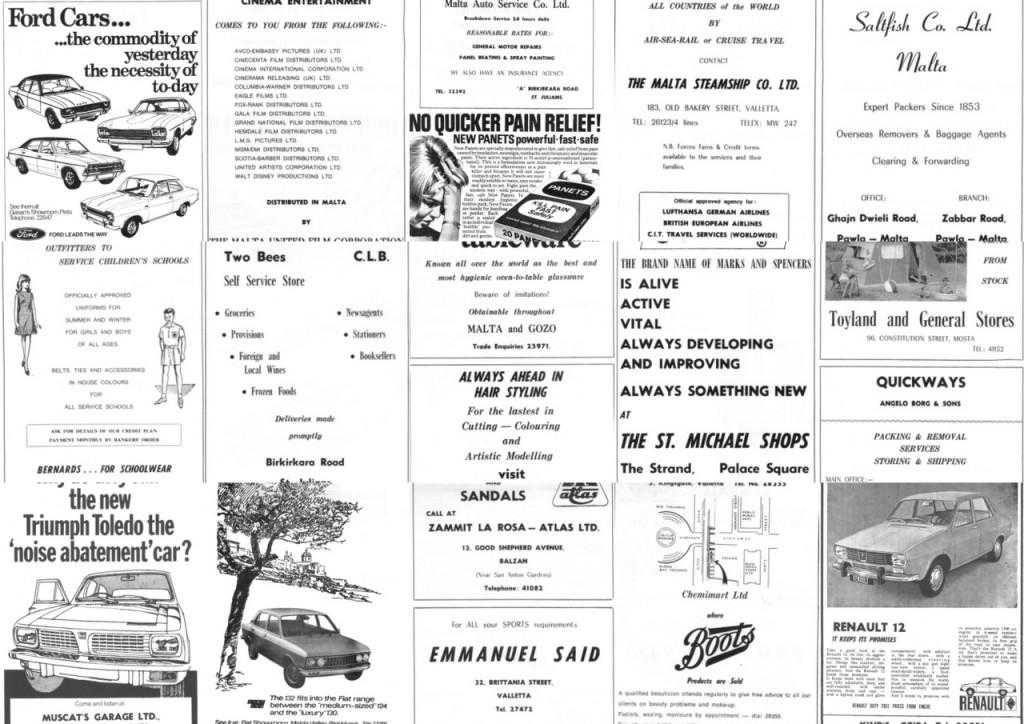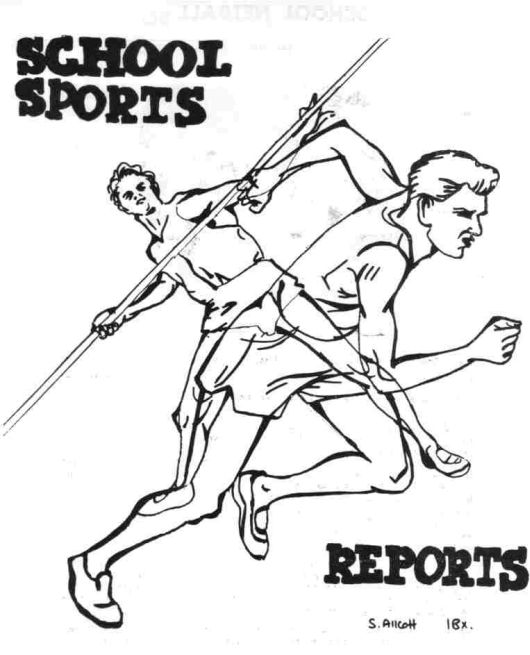TAL-HANDAQ SCHOOL
MALTA G. C.
JULY 1973CONTENTS
STAFF ............................................................. 3
HEADMASTER'S NOTES ................................. 4
CALENDAR OF EVENTS ...................................7
PRIZE DAY 1971 ...........................................8
THE MISSING TERMS ......................................14
OLIVER! ..........................................................18
CREATIVE WORK ...........................................26
SCHOOL SPORTS REPORTS ..........................29
INTER-HOUSE COMPETITION ..........................35
CREATIVE WORK ...........................................48
CLUBS AND SOCIETIES ..................................54
CREATIVE WORK ..........................................62
THE SCHOOL CRUISE ....................................67
FASHION SHOW ............................................69
SCHOOL GUESTS .........................................69
EX-PUPILS AND STAFF .................................72
FROM THE EDITORS ....................................79
PRINTED AT PROGRESS PRESS CO, LTD.
Tal-Handaq School
1972/73
Headmaster: Commander M.F. Law, M.A., R.N.
Deputy Headmaster: Lieutenant Commander J. Cottam, B.Sc., R.N.
Senior Mistress: Miss P.A.M. Smith
ASSISTANT STAFF
|
Mr. A.P. Allen Miss N.A Ash Miss S.M. Beckett Mr. J.J. Bonner Mr. M.G.A. Caseley Miss I.D. Dickinson Mr. D. Ditcham Mr. W. Entwistle Miss S.M.B. Etchingham Mrs. M. Manley-Harris Miss E.B. Fiddes Mr. L.L. Finnis Miss A.M. Gallagher Mr. J. Glover Mr. C. Hancock Miss V.H. Hill Mr. J.P.C. Hobson Miss M.M. Kearns Mr. F.G. Kitson Mr. A.L. Latham Miss J.I. Lattimer
Bursar: Mr. L. Bezzina Secretary: Miss E.M. Clarke Miss S. Camilleri Warden: Mr. J. Hayman Storehouseman: Mr. J. Treeby
|
Mr. B. Leonard Miss R.J. Leighton Miss M.A. Mackay Lt. Cdr. C. McCafferty Mr. B.J. Menhams Mr. J.C.G. Naylor Mr. R.A.M. Ransom Mr, T.N. Ricketts Mr. H.N. Ritchie Mr. S. Singleton Miss J.M. Stansfield Mr. D.J. Taylor Miss F.M. Turner Miss J.M. Walden Miss C.L. Walsh Mr. R.M. Ward Mrs. V.J. McCafferty Mr. R.R. Woollams Mr. A.K. Winn Mr. P.R. Wright MAGAZINE STAFF Editors: J. Glover J.J. Bonner Sub Editor: I. Dickinson Business Editor: J.J. Bonner
|
Headmaster's Notes on the Year
For reasons that are well known, this is the first Tal Handaq magazine for two years, the scheduled publishing date for last year having fallen within the two missing terms. An account of these missing terms will be found elsewhere in this magazine so I will not dwell on the subject here. Also to be found in this magazine is a copy of the report I presented at the 1971 Prize Day and as this included mention of the innovations that occurred in the Autumn Term 1971 these notes can, as usual, be confined to the current year.
It has, of course, been an unusual year, and in some ways a difficult one. For example, of the 500 pupils who joined us between September and December 1972 only 120 had been here before the withdrawal. When in addition you realise that 17 of the 44 teaching staff were also new you will realise some of the difficulties we expected merely in re-instating our routines. You will also understand our concern for the general traditions, customs and tone of the school which some of us had known for so long. It says much for the pupils and staff, and for their working together as a team, that at the time of writing (May 1973) we can honestly say that things are more or less back to normal. There have been changes, of course, but all, we hope, for the good, and I will enumerate some of them.
Firstly, the division of responsibility in the school has been adjusted a little further on the basis of experience of last year's change and the school is now divided into two, Upper and Lower School, instead of three. Lieutenant Commander Cottam, Deputy Headmaster, is Head of Upper School and Miss Smith, Senior Mistress, is Head of Lower School. These two work in close conjunction with me and with the Form Tutors in their respective parts of school and are able, when necessary, to advise parents on their children's progress and prospects.
Recent reductions in numbers were already making the operation of a four-house system difficult so on our return we reduced to three. We also took the opportunity to change the names, partly to avoid the invidious dropping of just one of the old ones and partly because even the most non-Service-minded person must have been aware of a slight tinge of naval bias in the four names 'Drake', 'Hawkins', 'Nelson' and 'St Vincent'. To demonstrate our Joint-Service allegiance our houses are now named after three famous World War II Chiefs of Staff, one from each Service: 'Cunningham', 'Alanbrooke' and Tedder'.
My 1971 Prize Day Report referred to changes in the Sixth Form organization, with the remark that it would be surprising if we got it right first time, and indeed we did not. We have had another shot this year, with the aim of reducing the unnecessary distinctions which seemed to be having a very divisive effect when we tried them out in 1971. I think we have achieved a measure of success in this respect but plenty more improvements still need to be made. This year we have tried to unite the Sixth Form, firstly by demonstrating our confidence in them by appointing them all as prefects, secondly by having a completely random division into tutor groups, and thirdly by bringing them all together once a week for a three-period session of Liberal Studies. Thus those doing the one-year school leavers' course and those working for 'A' levels have been thrown together very much more and the result has seemed to many of us to be a much more unified group who by their joint leadership have done a great deal for the school. 'I am grateful to them. Changes currently being planned for next year aim not so much to change the organization but to make the one-year course more attractive and more useful.
One good thing to have come out of the withdrawal is that the school now seems likely to enjoy a period of two years or so of uncharacteristic stability. Normally half the school leave in the course of each year but because so many Service personnel started new tours on their return to Malta comparatively few are currently leaving and the normal First-Year influx in September should bring our numbers to well over 600. To those who are leaving we send our good wishes and express the hope that they have both enjoyed and profited from their short spell with us and that they will take away happy memories of friendships made here.
I also take the opportunity of sending the school's greetings to the unusually large number of pupils and staff who have left us since publication of the last magazine, as well as to any earlier leavers whom this magazine may reach. We have made special efforts to get in touch with as many as possible this year and have included an extra large section of news from old pupils. Please keep the information coming in and if you want a magazine next summer just send us your name and address and a postal order for 25p.
I conclude these note's with a mention of what for me not only was the major event of the year but also characterised the spirit of the reborn Tal-Handaq in a tremendous team effort which brought us all together and of which we can be justly proud. I refer to the production of 'OLIVER!' The feelings of the majority of those who made up the five packed houses were generously expressed by the Commander British Forces Malta, Rear Admiral J.A. Templeton-Cotill C.B., in a letter to me and with his permission I quote it here:
'Now that "OLIVER!" has finished its run, I write to tell you that, as well as enjoying the production enormously myself, I have heard nothing but praise from your large audiences. It was an ambitious performance which admirably came off. Some of the acting was really excellent Mrs. Sowerberry, the Artful Dodger and Oliver himself and as for Fagin, he brilliantly managed to give the touch of the true professional without running away with the show. The chorus, too, were splendid and so obviously enjoying themselves. It was they who really gave your production of "OLIVER!" its fresh and Iight-hearted complexion.
May I say that praise from me is praise indeed! I can rarely be dragged to amateur theatricals and then only if I know the performers or have a personal interest in the play, but your production gave me one of the happiest outings I can remember in Malta. The spirit of the school plainly shone through your "OLIVER!" and I would ask you to congratulate from me producers, performers, musicians, scene shifters and everyone who contributed to giving your guests a memorable evening.'
Yes, we really are back in business.
STAFF CHANGES
In September 1971 we welcomed the following teachers to the staff: Mr. M.G.A. Caseley, Mr. C.J.L. Dawson, Mr. D. Ditcham, Miss M. Fletcher, Mr. M.G. Heath, Mr. B.J. Mentiams, Mr. J.C.G. Naylor, and Miss P.A.M. Smith. Little did they realise what an upheaval was to face them just four months after their arrival.
The list of U.K. based teachers who left in haste with us in January 1972 but who, for various very good reasons, did not return later in the year is depressingly long. It runs as follows, with dates of joining the school in brackets:
Mr. T.S. Moyle (Jan. 63), Mr. H.W. Harris (Sep. 66), Miss R.E. Jones and Mr. F. Smith (Sep. 69), Mr. D.P. Getter, Mr. D. Hudson, Mr. A. Jones, Mr. A.G. Strong and Mr. A.J. Wright (Sep. 70), Mrs. J.M. Swan (Apr. 71), and Mr. C.J.L. Dawson and Mr. M.G. Heath (Sep. 71).
The list includes many sterling characters and we miss them all. We remember them for their contributions to school life in various fields (academic, sporting and other interests) but we hope they will understand that space considerations preclude individual tributes to all except the two longest serving members.
Tom Moyle, who was with us for no less than nine years, was the first Religious Knowledge specialist to be appointed to the school and great credit is due to him for his work in setting up this department. He was a man of sincerity and integrity with an unswerving dedication to Christian principles. Many are those who have sought, and profited from his advice.
Harold Harris was another senior and highly respected Head of Department who was not only concerned with History but was also the Careers Master. He did a great deal in building up both these departments out will also be remembered for his prowess in the field of sport, particularly cricket. Just recognition for his work here came in his appointment as Deputy Head of St. George's School, Hong Kong.
One of the saddest consequences of the withdrawal was the passing of that noble band, the Locally Entered Teachers. These were usually ladies whose husbands were in Malta for various reasons (some being, teachers themselves) and whom we were allowed to recruit locally as full-time teachers. No mere stop-gaps, the LETs have been mainstays of the Tal Handaq Staff ever since the school opened and we are the poorer for losing them. Those who finally left us in early 1972 were: Mrs. C.G. Singleton (Sept. 65), Mrs. P. Perkins (Jan. 68), Mrs. H.J. Harland, Mrs. J.P. Harris and Mrs. M. Wapensky (Sept. 68), Mrs. C. Farmer (Sept. 69), Mrs. P.A. Wright (Sept. 70) and Miss J.R. Wakefield (Oct. 70). We are glad to report that Mrs. Singleton, Mrs. Harland and Mrs. Wright are still in Malta with their teacher-husbands.
On the reopening of the school in September 1972 we were joined by 17 new members of staff:
Mr. A.P. Allen, Miss N.A. Ash, Miss I.D. Dickinson, Mr. W. Entwistle, Miss S.M.B. Etchingham, Mr. L.L. Finnis, Mr J. Glover, Mr. C. Hancock, Miss V.H. Hill, Mr. J.P.C. Hobson, Mr. A.L. Latham, Miss J.I. Lattimer, Mr. H.N. Ritchie, Miss J.M. Stansfield, Miss C.L. Walsh. Mr R.R. Woollams and Mr. A.K. Winn.
It must have been about the same time that Cupid began to get busy, with the result that during the year we have had no less than three local weddings. Our good wishes have gone to:
Merilyn Fletcher, on her marriage to the Reverend Eric Manley-Harris, Royal Navy, on 16 December 1972,
Jill Wood, on her marriage to Instructor Lieutenant Commander Charles McCafferty, Royal Navy, on 23 December 1972, and Maureen Kearns, on her marriage to Flight Lieutenant Tim Whittle, Royal Air Force, on 26 May 1973.
Finally, it is with much
regret that we say goodbye to 'three members of staff at
the end of this term. Mrs. Jill McCafferty leaves the
school (but not Malta) to make a full time job of
looking after her husband (and helping with the homework
marking?). She will be missed not only by her Maths
pupils but also by the girls of Cunningham House. Miss
Angela Gallaaher is one of those unobtrusive people who
has quietly got on with her job of teaching English
throughout the school, and being an excellent form
tutor, all with complete dedication and very
considerable success.
She is
moving to a similar job at St. George's School Hong
Kong, who are indeed fortunate to gain her services.
Finally we are also sorry to lose Mr. Bill Entwistle who
during a very short stay with us has certainly made his
mark as Head of the History Department and Sixth Form
Master. To all of these we offer both gratitude and our
good wishes for the future.
Calendar of Events 1972/73
1st August
Visit by
Second Sea Lord and Chief of Naval Personnel, Vice
Admiral L.D. Empson C.B.
11th September
Tal Handaq School re-opened.
9th October
Lecture by Mr. John A. Jackson,
Director of U.K. National Mountaineering Centre.
7th - 16th November
Visit by
Careers Advisory Officers Mr. A. Webster, Mr. T. Selby,
and Mr. J. Vivian.
13th December Captain and Mrs. R.E. Wilson entertained to lunch in the Domestic Science Dept.
18th - 19th December School Concert and Inter-House Christmas Quiz.
19th January Visit by Deputy Director Educational Services 2 R.A.F. (Group Captain H.A, Probert M.B.E., M.A.) and Command Education Officer Near East Air Force (Group Captain F.G. Rice M.A.)
31st January Visit by Commander British Forces Malta, Rear Admiral J. Templeton-Cotill C.B.
7th February Visit by Controller, Service Children's Education Authority, Group Captain A.A. Mclntosh D.F.C., 'M.A., accompanied by Officer in Charge Schools, Malta and Naples, Instructor Captain H. Brierley M.A.
13th February Parent-Teacher Evening 1st and 2nd years.
28th February Captain and Mrs. H. Brierley entertained to lunch in the Domestic Science Department.
2nd - 5th March Visits to H.M.S. Ark Royal.
3rd March Fashion Show.
8th March Parent-Teacher Evening 3rd - 6th years.
16th March 6th Form and Staff Dance.
5th - 7th April ) School Production of 'Oliver!'.
9th - 10th April )
9th April Royal Marine Band Concert at S.C.S. St. Andrews.
17th May School Athletic Championships.
4th July School Swimming Championships.
11th July Open Day
Prize Day - 10 November 1971 Prize Day in 1971 was
for the first time held in Australia
Hall, St. Andrews Barracks, which has a
considerably bigger capacity than the school hall.
The Guest of Honour was Brigadier Paul Ward, C.B.E., A.D.C. (Commander
British Troops, Malta) and the chair was taken by Instructor Captain H.
Brierley, MA. Royal Navy, Officer in Charge Schools. Rear Admiral J.A.
Templeton-Cotill, (the Flag Officer Malta and Competent Authority for
the school) was unfortunately prevented from attending by illness but
his place was taken by Captain R.E. Wilson D.F.C. Royal Navy, his Chief
Staff Officer. To preserve the
complete sequence in Tal-Handaq School magazines the Headmaster's Report
is here included in full. It refers in the main to the school year
1970/71 but mentions a few innovations introduced in the Autumn Term
1971. Headmaster's Report Mr. Chairman,
Brigadier Ward, Captain Wilson, Ladies and Gentlemen (of all ages). I am sure the Guest
of Honour will forgive me if I begin by saying how sorry we are that the
Flag Officer Malta has been prevented from coming today. It was only
last July, on taking up this appointment, that he assumed the mantle of
the Competent Authority for Service Children's Schools in Malta and this
was to have been his first visit to us. We are very pleased to see
Captain Wilson in his place, and I'm sure he won't mind my saying how
glad we are to see in the chair Captain Brierley, through whom the Flag
Officer Malta exercises his control of the schools and who is our
immediate authority. Our Guest of Honour
is, I am happy to say, an old friend of the school and there is no-one
we would rather see presenting our prizes today. Brigadier Ward never
misses the opportunity of coming to a school function and is one of our
most loyal supporters. We are very grateful to you for your constant
interest, Sir, and for presenting our prizes today at this last
opportunity before you leave Malta. We are very sorry
that the Air Commander has been prevented from coming today, as I know
he wanted to come, but we are delighted to see him represented by Mrs.
Colahan. We receive excellent
support from all three Heads of Services and from the Heads of the
various establishments which provide the parents who provide most of our
pupils. There must be few Headmasters who have the good fortune to work
with parents who are so accessible, so well supported by their employers
and who are in general so sympathetic, friendly and helpful. There is a
great fellow feeling amongst Service parents, which fortunately extends
to us, because we are all facing the problems of what is now usually
called turbulence. I notice it when parents first come into my office
and find that to us a child who stays three years is a long-term pupil,
and it is also apparent when new children join the school and, almost
within minutes, are looked after and made to feel at home by their new
school mates. I think it is this happy atmosphere of friendliness and
co-operation between parents, staff and pupils that I have valued more
than anything else during my first two years at this school. May I just add to
what the Chairman has said about our use this year of Australia Hall. It
is interesting to look back to previous Prize Days and see that year
after year Headmasters have deplored the small size of the school hall
and the fact that so few parents and only about half the pupils
have been present. This year I decided to take advantage of the
discarding of our single-service allegiance and to experiment, and we
are very grateful to the Services Kinema Corporation and to Mr. Wellman,
the S.K.C. Manager, for allowing us to come here today, bringing with us
every remaining pupil from last year, a big step forward. Regrettably we
have still not been able to extend an invitation to all parents and,
perhaps even more regrettably, we have not been able to provide tea for
parents and prize-winners this year. I hope you will understand our
catering and other difficulties when not on our home ground. Most of the details
of last year can be found in the latest edition of the school magazine
and I should like to take this opportunity of paying tribute to those
who worked so hard to produce it, particularly Mr. Getter and his
editorial team. Those who have seen it will I am sure agree with me that
it is a first class school magazine by any standards, and probably one
of the best ever produced here. It has been the subject of many
compliments. Any Tal-Handaq report
must mention school numbers and we have at last had the expected fall
from 750 in September 1970 to 670 by the beginning of this term. But the
total is now over 680 and climbing slowly: My guess is that we shall
stay at about this level, and not drop to 630 as I suggested last year.
Perhaps the most startling fact, though, is that during the year no less
than 370 pupils joined (including those who joined at the beginning of
the year) and 420 left (including those who left at the end). This
represents well over 50% turnover.- " One thing you won't
find in the magazine is the examination results for last summer, so I
must mention them now. It is very difficult to make statistics like this
mean anything so I will summarise. In the Advanced level G.C.E.
examinations we had 53 subject passes, the highest number for the last
three years, and from the smallest number of candidates. But perhaps the
most significant thing is that the number' of candidates, papers and
passes was almost exactly the same as in 1963 but whereas this summer
the number of pupils in the school was 650, in 1963 there were 1,000. I
think this indicates very clearly the much higher standards being
achieved by the students of today dbmpared with their predecessors, and
I am sure you will agree that it reflects credit on the students and the
staff. At 0 level, we had
265 subject passes, and in the C.S.E. 183 graded results, including 13
at grade 1, equivalent to O level. Altogether, it was a
good year for A level and an average year otherwise. The A level results
are reflected in the fact that no less than 8 of last year's Sixth Form
are now at universities and another 2 are doing degree courses at
Polytechnics. Four have gone to Colleges of Education and a further ten
or more to other colleges for various diploma courses. These are the highest
figures for some years and perhaps the best indication that can be given
of the standard of education available at Tal-Handaq. As always I must
round off my remarks about examinations with a word of thanks to the
Director of Education for Malta, Mr. Mangion, for all the help given to
us by his Examinations Department in running our G.C.E. examinations. I
know that the Deputy Headmaster' and many of the staff who would
otherwise be concerned are very grateful for the. load taken off our
shoulders in this respect. Now it has often been
said that examinations are not the most important things in life, and I
certainly wouldn't like anyone to think that we devoted our attention
exclusively to them here. But, lest anyone think that I am
over-emphasizing them, let me just say that I wouldn't think I was doing
my duty to parents and their children if I didn't pay quite a lot of
attention to examinations in this school. Whether you like it, or
believe in it, or not, it is an unfortunate fact that examination
qualifications matter an awful lot in adult life, and a change of job 20
years hence may depend on whether or not you have got '0' level or C.S.E.
English Language Many of our pupils have been to so many schools that
they have not been able to do themselves justice. That is why I think
that a little bit of cramming may sometimes not come amiss in a school
like this, to make up for earlier omissions and generally to counteract
the effects of turbulence. I urge all of you pupils here today to make
the most of the opportunities you undoubtedly have at this school,
because I warn you that you may never have them again. I am afraid I am
going to skim very quickly over the subject of sport, because that
really is well covered in the magazine. I will just say that our
sporting activities have again included soccer, rugby, cricket, cross
country, athletics, hockey, netball, tennis, basketball, judo,
gymnastics, orienteering, badminton, squash, table tennis, riding and
sailing and I should like to express, on my own behalf, as well as on
behalf of you, the pupils and parents, our very grateful thanks to all
those members of staff who give up so much of their free time to
organising these events. Special thanks too to a few others: firstly the
Combined Services Saddle Club and the Malta Army and Naval Sailing Club
without whose assistance and facilities we could not run the riding and
sailing, secondly the officers and staffs who run the grounds at
Corradino and the Marsa and who are so 'helpful, and thirdly Mr. Smith,
a keen volunteer from amongst the ranks of parents, who is a most
enthusiastic manager of our cross country teams. Other extra-mural
activities also covered in the magazine are music, library, Art Club,
Pottery Club, Bridge Club, Photographic Society and Guides, and no doubt
others that I have failed to mention, and we are no less grateful to the
people who run these: Perhaps I should make special mention, because she
is a parent, not a teacher, of Mrs. Gledhill who so kindly runs our
Guides for us. That very extra-mural
activity the Helix Club, has not only settled down in its new quarters
at HMS ST. ANGELO but has also come rather more firmly under the
Headmaster's wing. The Helix is not everyone's cup of tea: it is a youth
club whose main activity is to hold a fortnightly dance in a discotheque
atmosphere with very loud music. But it is well run by its own student
committee, backed by members of staff and parents, some of whom are
always present. I do commend it to those with strong eardrums and I
think parents need have no qualms about letting their children come.
Parents are always welcome to call in if they want to see it for
themselves, and we should be very glad to have some more who are
prepared to do a duty stint in the support role. My sincere thanks go to
the few stalwarts, parents and staff, who give up their Friday evenings
for this purpose at the moment. I should like to
conclude with some account of the changes that have taken place, and are
taking place, because I believe that is really what a Headmasters'
report should be all about, not simply a catalogue of the year's events. On the material side,
cables were at last laid in the trenches that were with us for so long
and block storage heaters have been installed so that, for the first
time ever, most of us will be warm this winter. Modernisation of our
oldest lavatory block is now finished and we hope that the next job will
be the building of more covered ways so that we can move about the
school in wet weather. Once again we are indebted to the D.O.E. for
their unfailing co-operation and helpfulness, and we were very sorry to
say goodbye to Mr. Shepherd, our local Depot Superintendent, who looked
after us so well until he left this summer. Perhaps I might;
include school lunches under the heading of material improvements. Our
new caterer has now been with us since September 1970 and has had
considerable success in terms of numbers. My eye was caught by an item
in last Sunday's paper referring to proposals designed to bring back
U.K. children to the expensive and apparently unattractive lunches they
have deserted. Self-service cafeterias serving hamburgers and chips,
bangers and beans and soft drinks were being asked for by the Inner
London Authority Catering Committee. It's nice to know we are ahead of
the ILEA in some things: we have all those. I think a
major area of improvement during the year has been in our contacts with
parents. We had two, very well supported, parent-teacher evenings
instead of one, with teachers less dispersed and far more accessible, We
have introduced homework books partly for the benefit of parents who
like to see what work has been set. We have scrapped the old report
forms and introduced three new ones which we hope parents, and future
schools, will find much more informative. We have revised our own record
system so that information provided by parents and previous schools is
now much more accessible and more likely to be used. And lastly, for our
careers evening at the beginning of this term, there was an enormously
improved response compared with last year. About 200 parents accepted
the invitation to come and meet the visiting careers officers. Several other changes
were planned during the year and introduced at the beginning of this
term. One was a complete rearrangement of the subject choices available
in the fourth year (a bigger problem than it sounds), another was a
complete revision of the arrangements for the Sixth Form. Those not
embarking on A levels now either have a second chance to attempt a
complete set of 0 levels or else may take the one-year Sixth General
course, a school leavers' course planned round the core subjects of
English and Maths and including a number of practical and other subjects
which it is hoped will provide an interesting and useful preparation for
leaving school. This course is necessarily experimental and it would be
surprising if we got it right first time, particularly since we are
working in an area where few schools have any experience. We are well
ahead of the U.K. in this respect, as while they are planning what to do
with pupils who stay on from 15 to 16 we are dealing with those who stay
from 16 to 17. We already have some ideas for next years' improvements,
including more unification of the three Sixth Forms, but we shall rely
quite heavily on this year's General Sixth for advice and I hope they
are going to give us some sensible, well thought-out and constructive
suggestions. In order to keep in closer touch with the needs and
progress of our pupils we have introduced a new division into Lower,
Middle and Upper Schools, with the Senior Mistress as Head of Lower
School, the Deputy Headmaster as Head of Middle School and myself
looking after the top two years. Parents will find themselves
corresponding with the Heads of the Lower and Middle Schools for pupils
in those forms, rather than with me all the time Not only will this
achieve better contact but I hope it will reduce the amount of paper on
my desk. The other change
which has slid in fairly unobstrusively is that we now not only have
full non-denominational assemblies but also joint, non-denominational
religious instruction throughout the school. I hope parents of all
denominations will agree that this is good ecumenical progress. The final change to
which I must refer is in personnel. I have already mentioned the
tremendous turnover of pupils, but the same is true of staff. Firstly,
on the administrative side, during the last twelve months I have
broken-in so to speak, my third secretary, and we have also had a new
assistant secretary and, more recently a new Bursar. I should like to
pay tribute to them all (past and present) for their support and
devotion to the school. On the teaching side, during the last two years
29 members of staff have left, including 11 Heads of Departments so that
nearly all the Heads of major departments have changed in this two-year
period. This is an upheaval, of course, but a very healthy one and the
influx of new blood ensures that we and other Service Children's Schools
can never be accused of being cut off from the mainstream of educational
thought in the United Kingdom. I should like to pay tribute to all those
who have served us so well and I must, of course, make special mention
of Miss Yule, whom we are so glad to see with us today. I have paid
tribute to her in two successive magazines, on Prize Day last year, when
mentioning her M.B.E., and at our end-of-term service in July when her
22 years service at Tal Handaq finally came to an end, and it was a
considerable relief that we got through that without either of us
bursting into tears. I don't intend to run the risk again and will only
say how pleased we are to see her here to-day in her new role of
distinguished guest and old friend of the school. I take the
opportunity of welcoming and introducing to the guests our new Senior
Mistress, Miss Smith, and to say that we none of us envy her the
difficult task of handing to the Brigadier the right book for the right
prizewinner at the right moment under the eagle but fortunately kindly
eye of the one who has performed the task on at least the last fifteen
occasions. I should like to
thank all the staff for what they do here, and for the support they give
me. And in that respect I should like to mention one more name, that of
my Deputy, Lt. Cdr. Cottam, as it seems possible that he won't be
present to hear me mention it on this occasion next year. He, and his
wife, do a tremendous amount for this school and we are very grateful to
them. We are sorry that he has been sick for so long this term but if it
was overwork he was suffering from, it was certainly an odd place to
show the symptoms. We are nevertheless delighted that he is now once
again able to sit down. And before I do the same let me just finally say
thank you to you, the pupils, for being such a cheerful and, on the
whole, enthusiastic lot in the face of the difficulties which together
we try to overcome. There is little doubt in my mind that most of you
enjoy being here just as I enjoy being your Headmaster, except when I
come to the invidious task of selecting prizewinners, when we have to
leave out so many deserving names. Thank you all.
Brigadier Ward
PRIZE LIST - NOVEMBER 1971 FORM PRIZES 1AJ Susan
Perkins Heather Appleford 1AF Jacqueline Edwards
Antony Nolan Peter Campbell 1B Jennifer Jones
Andrew Barton Kim Else 1C1 Tony Saxby Nichola
Gibbs Cheryl Sanderson 1C2 John Thompson
1C3 Sonja-Jo
Gilbert Francis Lewis 1C4 Stephen Gadd
2A1 Adrienne Yentis
Sharon Dreher 2A2 Elizabeth Knight
Julie Kelly Deborah Foreman 2B Shannon Branch
Andrew Limb Jacqueline Munphy 2C1 Linda Eldridge John
Lewis 2C2 Susan Cowley
Michael Duguid Christina Darmody 2C3 Michael Tutty Billy
Moss 2C4 David Wallum
2D Clare Phillips Simon
Cronin Julie Stephenson 3E Antoinette Ford Roger
Combles Susan Janaway 3F Gary Turney Glen
Jones Karen Beer 3G Lesley Nilsen Elizabeth Armstrong
Robert Hunt 3H Christine Mitchell
FOURTH YEAR
Elizabeth Revell Judith Rice Philip Smith
Richard Wapensky Boaz Keyslay Maddalena Fallucchi
Paola Martinelli Paul Noonan Peter Hubbard
Kathryn Taylor Tony Riggs Sharon Speer
Tina Morrison Linda Bridgart Janet Roebuck
FIFTH YEAR Judith Blair Rosalind Gary
Belinda Dunning Lynn Eder Robert Davis
Robert Broadway Colin Marsh Beverley Chidgey
Denise Jones Lorraine Perrow SIXTH FORM General Prizes Jane Powell John Lavin
SUBJECT PRIZES English: Caroline Gary
Mathematics: Dominik Wujastyk Geography: Elizabeth Stewart
RK:
Julia Hann Keith Mariner Science: David Kingdon
Jane Stephenson Carol Turley
Commercial Subjects: Diana Cornish Needlework:
Theresa Smith Technical Subjects: Graham Rowley
Art: Janet Harvey Christine Kingsbury HEAD BOY: Mark Bradberry HEAD
GIRL: Jane Stephenson For the first two terms of 1972, during the
period of the British Services' withdrawal from Malta, Tal Handaq School
did not exist. This magazine reaches a wide circle of readers outside
the circle of current pupils and staff and we think that many of them
may be interested to learn something of what went on during that time.
Some, of course, will themselves have taken part in the withdrawal but
perhaps did not return. Others may well be thankful that their time in
Malta ended before December 1971 because they can imagine only too
vividly what was involved. For most of us it was a nightmare which we
shall find difficult to forget (or forgive) but in other ways it is now
difficult to believe that it ever happened. It was during the afternoon
of Wednesday 29 December, four days before the scheduled start of the
Spring Term, that the news came over BBC Overseas Service, like the
proverbial bolt from the blue, that we were to leave Malta. For most of
us there had not been a whisper of such a possibility, at least not
since the previous August, when we had all been half expecting something
similar. The school was on holiday and large numbers of staff were on
Christmas leave in U.K. The reaction of most (in the initial absence of
official information) was sheer disbelief, but it soon became clear that
we were in earnest. It was quickly decided that the schools would not
re-open at all for the Spring Term, but the pre-arranged plans which
were put into operation were made all the more difficult by the fact
that the pupils were not here to take home advice and instructions or to
help in sorting out books: there was no further direct contact with the
majority of them after the school broke up for the Christmas holidays,
at which time, of course, there was not a thought of the impending
closure. It is perhaps as well to make it clear that
at this stage what was being planned was a permanent closure of the
school, not a temporary one. Some of our local friends began by saying
'Don't worry, you won't go' and later changed this to 'Don't worry,
you'll be coming back' but unfortunately we were in no position to heed
them. Those who followed the crisis carefully may remember that during
the first two weeks of January, while the families were being evacuated,
there was not a suggestion of political negotiation. Had we ever thought
that there was a whisper of a possibility of our coming back we would
have done many things differently (like not burning all those old
records and files). To cut a long story short, we spent about
two days desperately writing the school reports which we had in any case
been about to prepare, but which now needed additional information to
facilitate transfer to new schools. I need hardly add that the hardest
hit pupils were those whose entries for C.S.E., '0' level and 'A' level
we were just in course of preparing. Whether they all succeeded in being
entered for something like the right examinations we shall never know
but no doubt, with the customary resilience of Service children, most of
them managed to overcome their difficulties. No attempt was made to
recover textbooks m the possession of pupils. This was the least
contribution we could make to helping them over the inevitable gaps
before they could join new schools. As reports were finished, packing began,
personal and school, and the first families and staff began to move in
the first week in January. There will be many old Malta hands who can
imagine only too vividly the personal problems of a
lock-stock-and-barrel departure at something like one week's notice,
particularly for those who had been here a long time. There was
nevertheless a tremendous response to the call for help at school and
the activity was phenomenal. The working party gradually diminished in
size as families were airlifted out but by dusk on Friday 14 January,
about 24 hours after the departure of the last family, just about every
movable piece of equipment in the school had been dismantled, stockpiled
in the Hall and finally packed in one of the 400 packing cases that were
despatched to the Central Ordnance Depot, Bicester. As darkness fell the
three Naval members of staff watched the last lorry-load depart,
collected their personal belongings and somewhat sadly retired to the
sanctuary of Fort St. Angelo, wondering if they would see the school
again. At that point the Malta Government lifted its second deadline and
it did after all prove possible to return to the school the following
week so that a more prolonged clearing up operation could be carried out
with willing and invaluable assistance from the Maltese industrial and
non-industrial staff and a small but valiant band of locally-entered
teachers who were staying in Malta. Besides achieving prodigies of
packing, the latter did much to look after the Naval rearguard. While this process was going on the
Headmaster returned to Eltham, partly to advise on the possible
reappointment of teachers and partly, with the assistance of the Senior
Mistress (Miss Smith), to deal with the mountain of pupils' documents
which had been airlifted direct to the Service Childrens' Education
Authority. Working on these documents, and attempting to trace the
schools to which the pupils had gone, so that the documents could be
forwarded, took a month. During this time the Deputy Headmaster returned
home, leaving Instructor Lieutenant Commander McCafferty as the sole
representative of the Service Children's Schools in Malta. Meanwhile the
staff were left in limbo, with reappointments to other Service
Children's Schools held up (in most cases) for reasons which at the time
were not easily explainable. The outcome is now well known and in early
April, to the astonishment of most of us, the operation was put into
reverse and instructions were given to begin preparations to reopen the
school. At this point came the first of manv difficulties; to whom
should these instructions be given? The Officer in Charge Schools
(Captain Brierley), the Staff Officer Schools (Squadron Leader Edwards),
the Headmaster and the Deputy Headmaster had long since been reappointed
to new jobs and, although still on leave in most cases, were just about
to take up their new appointments. Fortunately this initial planning
difficulty was overcome by the reappointment to their old jobs of the
whole team of Service Officers in the Malta Schools. Lieutenant
Commander McCafferty was, in fact, only away from Malta for four weeks. We suddenly began to take an interest in
all those packing cases, some of which had been rattling ominously even
as they left the school. ('Unbanded, badly packed and mainly overweight'
was the cri de coeur of one harassed Army Officer somewhere along the
line to Bicester as if we didn't know!) Problems arose. For example
the case labelled 1181 on one side and 1181A on the other could have
contained a New World domestic gas cooker or a baby grand piano. COD
Bicester had to open it to find out - - but perhaps they aren't very
musical! Fortunately it turned out to be the piano, and in good
condition too. People began asking questions about the
school, to which we could only answer 'What school?' as quite clearly it
didn't exist except as a collection of buildings. It did not even have
books to speak of because, as already explained, most of them were in
the hands of the pupils at the time of withdrawal and were not
recovered. The Malta Schools Planning Group was set up and for Tal
Handaq it consisted basically of the Headmaster and Miss Smith for head
scratching duties at Eltham and Captain Brierley (Officer in Charge
Schools, Malta and Naples) for table-thumping in MOD (to very good
effect). Twenty of the previous staff, including eight Heads of
Departments, were not returning for various reasons and briefly the
problems were that you can't order books and equipment without Heads of
Departments, you can't plan a staff without an outline time-table (and
you can't engage new staff after the end of May), you can't make a
time-table without knowing what pupils you are planning for and, as were
were expecting very few pupils back, at this point we really entered the
realms of fantasy. We therefore got out our crystal ball, thought up a
few numbers and attacked these tasks, with the assistance of staff (old
and new) called from all corners of the British Isles, willing
co-operation from all sides and remarkable tolerance from our hosts at
Eltham, who clearly wondered what we could be doing for so long. Meanwhile, back in Malta, a steadily
growing advance party of teachers, led first by Lieutenant Commander
McCafferty (who was first back) and later by Lieutenant Commander Cottam,
rolled up their sleeves (or stripped down to their bikinis, as
appropriate) and got down to work. The problems were innumerable and
signals flashed to and fro between Malta and Eltham. Could we be ready
in time for the Autumn Term? What was the state of the fabric of the
school? How much of the equipment was broken? And so it went on. The 400
packing cases returned, this time in containers, right into the school,
and by early July most of the returning members of staff were there to
unpack them. To cut another long story short, more
willing and cheerful co-operation from all sides, not only from the
staff but also from the Department of the Environment, and from all
Service departments in Malta, ensured that we were ready (well, more or
less) for the start of term on 11 September 1972. The school reopened
with 460 pupils (including 120 old ones) and 44 staff (including 17 new
ones) and numbers then gradually picked up to just over the 500 mark by
Christmas, at which level they stayed for the rest of the year. Present
indications are that by September 1973 the numbers should be approaching
650, not far off the pre-withdrawal total of 700. Thus ends one of the more unhappy chapters
in the history of Tal Handaq and, although the effects will be felt for
a long time to come, we are now once again taking in our stride the
problems of patching up disrupted educations and we hope that readers
outside the school will find ample evidence in these pages that we are
very much back to normal, in fine fettle, and ready for anything
anything, that is, except another .... but no, I musn't say that, must
I?
M.F. LAW THE WITHDRAWAL FROM MALTA When my parents told me that the British
forces in Malta were definitely leaving the island, I was very miserable
because I had enjoyed living in Malta. Soon our flight papers came and
we were to leave in a few days time. Our family were kept very busy
during those days, packing our belongings into crates as fast as
possible. When they were packed, we sent them on the lorry, which took
them to the airport to be sent back to England. I shall never forget the day we left Malta,
because, as the aeroplane climbed, I looked out of the plane window at
the island that had been my home for the past seven months and wondered
if I would ever see it again. I was rather ill during the flight on the
V.C. 10 but the landing was worst of all. We landed at Brize Norton
airport and the first thing that I noticed as I got off the plane was
the difference in the weather. If was freezing cold. We then caught a
coach from the airport which took us to King's Cross station in London
where we were to catch our train. There were lots of soldiers to help
the families with their luggage. We caught our train to Darlington which
is up in the north of England, where we were going to stay with my
grandparents. I had to go to a new school called Colburn
Primary School. I was not looking forward to it very much as I don't
like joining new schools but I soon settled down and quite enjoyed the
few weeks I was there. Later, we moved to a quarter near Ipswich,
Suffolk, as my father was joining H.M.S. Ganges. No sooner were we
settled in than we had to start packing again, for my father was
recalled to Malta. I wasn't happy about it at the time since I was
beginning to feel rather unsettled by all this moving around. We came back to Malta on the 10th July, and
I was very pleased to see some of my old friends when I joined
Tal-Handaq school.
IAN MCLAREN 1BY
Tal Handaq boxing team!
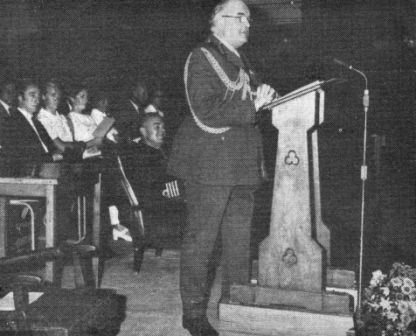
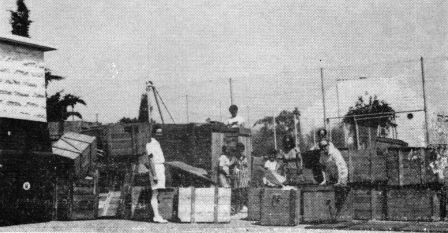
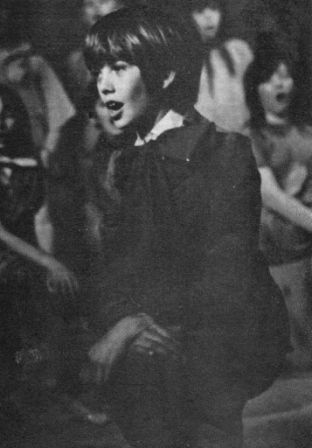 Philip Kitson
Philip Kitson
For several weeks of the Spring term, members of the pupils and staff of Tal-Handaq seemed to wander around humming the melody of "Oom-pah-pah" or "Consider Yourself at Home", but this was not so much a reflection of the normal happy atmosphere in the school as an indication that Tal-Handaq was about to present its first stage production since the British withdrawal in 1972.
The musical, "Oliver!" was staged by pupils and staff on April 5th, 6th, 7th, 9th and 10th.
Originally, the production had been planned for three evenings only, but the immense and unprecedented demands for seats led to an extension over two more days: a decision which placed very heavy demands upon children who were putting in an ordinary day at school, and then appearing on stage until after 10 o'clock each evening.
That they responded magnificently was amply confirmed by the enthusiastic comments -- ranging from: "Excellent!" to: "Smashing!" - heard from the audience on each of the five nights.
Philip Kitson, in the title role, was not only facing his first stage appearance, but had to battle against a throat infection which added to the already considerable difficulties of this demanding part. In spite of this, he gave a very captivating and charming interpretation which was pitched at just the right level. Inevitably, there are few scenes in "Oliver!" which do not include the central character himself, and Philip's performance, prolonged over five nights, yet recommencing with freshness and vitality each time, rightly earned the enthusiastic applause of the audience.
'He deserves every congratulation on his excellent handling of this vital role. Daryl Cornner, as the Artful Dodger, also met a taxing and sustained challenge with success, his perky and confident 'Dodger' being presented most convincingly. Mrs. Corney (played by Jean Boomer) showed a good sense of characterisation and comedy timing.
Mr. Brownlow (Richard Lovell), Mr. Sowerberry (Rob Ward), Mr. Bumble (Jim Glover), and the brutal and villainous Bill Sykes (Phil. Allen) were all convincingly well cast. Indeed, on at least two evenings, Bill Sykes earned that significant tribute to the success of any villain's part - - applause when he meets his violent and well-deserved end!
From a total company of no less than 78, all of who deserve their own share of praise, it is a difficult and invidious task to single put a few individuals, but --at least to this "layman" member of the audience it seemed that, apart from Oliver himself, Ann Partridge as Nancy, June Lattimer as Mrs. Sowerberry, and Trev. Ricketts as Fagin were outstanding members of a generally excellent cast. The role of Nancy presents particular challenges, in that the characterisation is required to range from the noisily-humorous to the quiet and tender, and Ann Partridge handled both extremes with great skill. The especially enthusiastic applause which greeted her at the end of the show was no more than she deserved. June Lattimer's task was a different one: the notoriously difficult problem of treading the narrow borderline between comedy and farce. This she did with accomplished ease, and it was a tribute to her success that her "laughs" came when and where they were intended.
The character of Fagin, of course, runs as a continuous thread throughout "Oliver!" and there can be no doubt about the very high standard of the sustained and polished performance of Trev. Ricketts in this part. His Fagin would have earned commendation on any stage, anywhere, and may most suitably and fairly be called "professional."
The production of this show was in the hands of Sylvia Beckett, who had the far from easy task of directing a large cast on a small stage. Audience reaction, both to individual characters and to the full company, was in itself a testimonial to the Producer, who might collapse exhausted at the beginning of the school holiday comforted by the knowledge that her efforts were successful, and recognised as such.
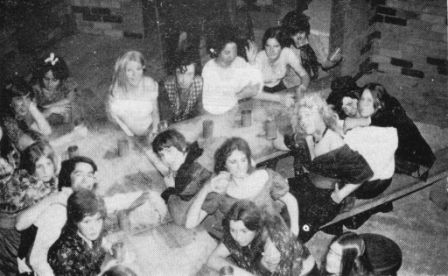
At "The Three Cripples".
On the musical side, the enthusiastic singing of the chorus set a suitably lively and attractive opening pattern to the show. In some ways, the most difficult items for the soloists must have been the slower and more serious songs, and in these, the "Oscars" must go to Philip Kitson and Ann Partridge in their roles as Oliver and Nancy respectively.
A most enjoyable musical moment came in the quartet by the "street sellers", whose skilful and sensitive singing was wholly delightful.
The musical accompaniment was provided by Barrie Menhams (piano) who was also the Musical Director, Judith Stansfield (organ), Jeff Bonner (clarinet), and Bob Wollams (bass guitar).
Just as there are few scenes in which "Oliver" does not appear, so there are few periods when music is absent, either as accompaniment to the songs or as a creator of "atmosphere".
Barrie Menhams and Judith Stansfield were thus called upon to undertake a long and sustained musical effort, which was outstanding in the pleasure it brought to the audience.
Patrons of Tal Handaq school productions have learned to expect a very high standard of professional expertise from Steve Singleton and his Art department, who designed and painted the sets, Brian Leonard and the Technical department, who were responsible for scenery construction and lighting, and Mave Turner and the Home Economics department, who produced the costumes and provided the refreshments.
The lighting and sets were excellent, and one of the latter (on the first appearance of the "Paddington Green" scene) brought forth the tribute of spontaneous applause when the curtain rose.
If one is to select any particular example of first-rate costuming, it would probably be the London street scenes, where the "My Fair Lady" atmosphere was delightfully presented.
Altogether, this was a most enjoyable and tuneful show, and an encouraging sign, as far as drama and music are concerned, that Tal Handaq is once more well and truly settled into its stride.
Nothing could be more infuriating and humiliating, at the end of a school production, than the comment: "It was very good, considering it was done by children."
Fortunately, no such patronising remark even suggests itself on this occasion. "Oliver!" at Tal Handaq school was a lively and enjoyable show which brought great pleasure to close on 1500 people.
The printed programme mentioned "an army of willing helpers" and referred to "long suffering and forebearance" on the part of many, and it is appropriate (if obvious) to point put that a production of this kind is above all things a corporate effort, in which the "backroom boys" doing the make-up, the person who knows a man wiho thinks he might contact the chap who said he believed he had just the 'prop' which is required, or the brewer-uip of cocoa to sustain a tired and tense cast, all have their important, though sometimes unglamorous parts to play.
Indeed, it might be argued that from the point of view of "education" - in its best and widest sense the most valuable part of an "exercise" of this kind is the sense of unity which is created by any school effort play, concert, sports day , or whatever -- which, in these days of merely watching others do things, provides children with the feeling that "WE" are working together to a common end.
In every way, "Oliver!" was an example of what Kipling truly, if not very poetically, calls: "The everlastin' teamwork of every bloomin' soul."
The only reason it did not continue to play to play to packed houses for an additional five nights would appear to be the physical and mental endurance-limits of the children and -- even if to a 'lesser extent of teachers and parents, and the welcome arrival of the Easter holidays.
Parents of children in the cast of "Oliver!" may well have found their offspring unusually quiet and subdued after the end of term, for this excellent production undoubtedly taxed everyone to the limit.
However, children have a way of bouncing back fairly quickly,. and no doubt they made their presence known before many days had passed.
One can only quote from some of the numerous catchy songs in the show, and say that if, after a long term, staff were inclined to retort: "That's Your Funeral", parents who found themselves declaring: "I shall scream!" might plead fervently to Tal Handaq: "Be Back Soon!"...... And they were!
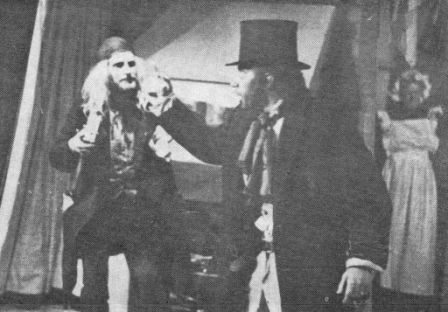
Sykes & Fagin
The Sowerberry's.
Consider
Yourself,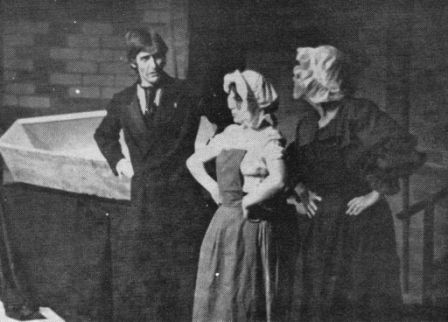
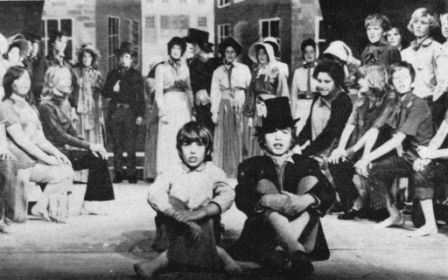
From the Inside, Looking In
As a prompter in this year's school production of the musical 'Oliver,' I am inclined to believe that I saw a great deal more of the hard work, enthusiasm and concentrated effort that was put into it, than most people.
I first joined the rehearsals for 'Oliver1 about three weeks from the date of the first performance and I must admit that I was surprised by the incredibly high standards I found there. As the performance dates drew rapidly nearer, I became aware that although most of the actors were word perfect there were a few who were not so sure of their words. Frankly this worried me, because it meant that I had to remain alert and follow the dialogue intensely.
On the opening night I do not think there could have been anyone more nervous than myself, except perhaps Miss Beckett. From my chair, situated behind the right-hand curtain, I was not able to see the whole of the stage but even so I found it difficult not to become totally absorbed in the performance. There were times when a line was missed out or required prompting but on most occasions the actors quickly corrected themselves. Luckily for me !
I spent almost all of the performance time back-stage, and in doing so, knew the play so well that I could detect the slightest alteration or change of words.
During the time I was involved with 'Oliver', I became better acquainted with staff and pupils alike, that I would not normally have come into contact with. I think it was this mixing of juniors, with seniors and staff and the spirit of teamwork and co-operation between them that was produced, that impressed me more than any individual performance.
Perhaps next year I shall be connected with the production in a far less alarming, but, I hope, as useful, capacity.
Chris Harrison L6
IT HAS BEEN RUMOURED ,
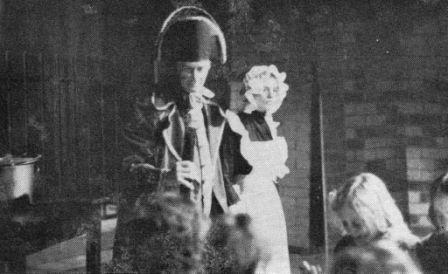 Mr Bumble and Widow Corney
Mr Bumble and Widow Corney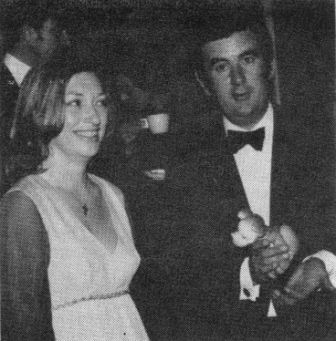
Charles Dickens, Lionel Bart and Mr.Bumble for proclaiming, "The Law is
an ass." Sadly, The Admiralty has removed the Headmaster's marriage
allowance on hearing that "The Law is a bachelor".
..- that Trevor Ricketts has not been able to appear publicly since 'Oliver'. Well! He can't afford to have his wig cleaned.
that since he could see so little of the stage from his lonely corner, Clarinetist Jeff Bonner fixed an appropriately-angled mirror to the piano. This worked splendidly until the Three Cripples Scene, when the glass became too misted up by Barry Menham's heavy breathing. that on three nights June Latti- mer inadvertently spoke her lines from the forthcoming "Blithe Spirit."Producer and Musical Director.
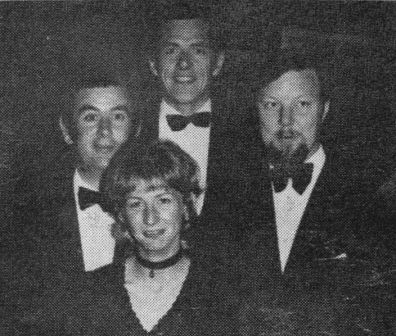
No-one noticed except Rob Ward (stage husband -- Mr, Sowerberry) who responded with a few bars from "June is busting out all over." He explained that she was over-rehearsed". Prompters Chris Harrison and Angela Sellers had already fainted.
...... that Daryl Cornner is the Artful Dodger
Dave Taylor was norninate for a versatility Oscar. Not only did he combine superbly efficient stage management with a quick side-line selling gold tops, but he also assumed the role of Alexander when cutting Gordian knot of badly tangled scenery rope on the Saturday. To cap it all, When Philip Kitson seemed destined to succumb to tonsil fatigue, three members of staff were standing by with shoe-horns, ready to squeeze Dave into the Oliver costume? It had to be . Dave, was the only one capable of reaching the high notes!
...... that Phil Allen and Jim Plover have receiyed offers from the Malta Choral Society - gags!
The Power-House Four
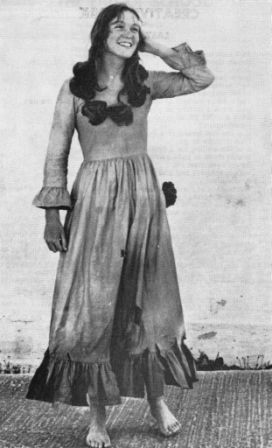
Nancy
CREATIVE WORK
LAST LESSON
As I look around the grey room, I see Brown doodling, Jones talking, and Smith tearing paper.
As I ramble on about World Population, Smith scrapes his chair along the floor.
The eyes of the rest of the class are turned towards me as I give them a lecture on paying attention.
After a silent pause I start again. It is the last lesson of a Friday afternoon. Five minutes to go,
It is like waiting for a time bomb to go off. Brown starts to pack away his books; As my eyes meet his, He unpacks his bag and stares back Innocently.
The sounds of the class next door leaving, Arouse my class, They give looks of helplessness. Jones looks at his watch. I start talking again,
With only a minute to go, I give instructions for homework.They all give a sigh of disappointment. Five, four, three, two, The bell rings.
All is silent. I am aware of all the class's eyes towards me, "Good afternoon children," "Good afternoon Miss" they reply very hastily and hurriedly.
"You are dismissed." A chorus of hoorays echoes round the classroom, Scrapes and cheers are heard from every direction of the room.
A door is slammed. From outside I 'hear running-shouts of Goodbyes
Jane Elwell 3E
THE REVOLUTION
An agonised cry rent the still air. With it came the stench of blood and death. A few seconds later a boy came pounding down the street, "Run!" he cried. "Run for your life, - - the soldiers are coming for a second attack. Run! Run!" He panted on down the street and I stood completely still as I heard his voice grow fainter. When at last the boy's voice had died away completely, I suddenly started to life. The boy was right about the soldiers, as I looked to the west I could see three battalions moving up on the city and quickly. There was no time to run to safety I would have to hide at once. This was easier said than done, everything around me was in ruins. I would be lucky to find shelter here. Having no other choice I ran to a half ruined wall and collapsed behind it. I was just in time, for a forward party which I had not seen came crawling through the main street. A shiver ran up my spine as I caught sight of one of the guards. It was a hideous thing. It had no arms or legs but just hands and feet sprouting from its body, and eyes and a mouth in its neck. At this sight I passed out! I awoke a few moments later to see one of these creatures standing over me with a sword in its hand. In its eyes I could see a look of greed and hatred, and as it raised Us sword to kill me I found myself unable to move. I closed my eyes and waited for the feel of the sword blade in my neck but it never came. At last I opened my eyes to see what was happening, and to my surprise everything about me was quiet. I clambered to my feet and stumbled into the main street. A grotesque sight met my eyes. There were people sawn in half, boiled corpses in pots and bodies still roasting on spits. What puzzled me was that there were no -creatures of the kind that I had seen lying dead on the ground. A sudden instinct made me look to the east; the army was marching steadily on toward the next city. I was the last human being in this town the only one to survive the battle of the spirits. I would live to regret.
Dianne C. Lyons 1AY
|
MERLIN "Sorcerer of centuries; Hair, white and matted And evil-smelling: Face, begrimed and wrinkled Like a raisin. Your hands, calloused and nails Filthy - Why do you sit here In your cave, in the dark, And ponder over spells and charms r. And be forgotten? Are you waiting for Arthur's return? Don't you sometimes wonder about the fruitlessness of it all? I mean, who is going to believe him Anyway, if he does eventually return ... 'Arthur, King of Camelot!- - sure I believe you, mate: I'm Sir Lancelot! Ha! Ha! Ha! You ought to be put away, man, Loons ought to be put away.' Merlin,
|
Sorcerer of old; Shaman, Mage, Seer, Sitting in the mouldy gloom, surrounded by your cobwebs and rusty cauldrons, in which, (In those good old days When knights abounded and dragons breathed fire over .hills and vale) You once brewed your philtres and potions for the needy. Perhaps you are right to wait, For the coming of Arthur, the second time around. Maybe you realise, 0 Wise One, That the Twentieth Century, Is not fit, for one so bold and chivalrous , As noble Arthur: And so you are content to watch Us Blow up and destroy ourselves (and all that is good) Until one day, a new race emerges, One, into which Arthur, with Lance in hand, May safely come to and be believed in. Are you waiting for that day, Merlin? Because, if you are, Would you mind If I joined you?" Janette Ross 5L
|
SCHOOL NETBALL
1st VII
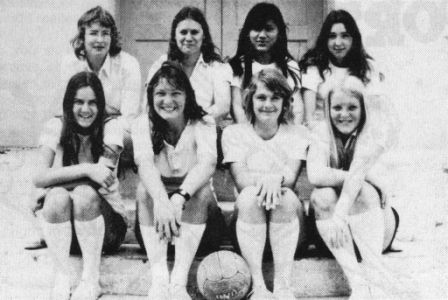
Back Row: Sara Harbour, Carol Easton, Susie Griffiths, Philippa Knight.
Front Row: Janet Hinde, Ann Partridge, Ann Langford, Jacquie Morris.
(Vivien Lowson and Valerie Holsgrove also played).
As has always been the case, fixtures for netball have not been as easy to come by as they have for hockey. However this does not alter the fact that we have many netball enthusiasts, who, during the Autumn Term, turned out religiously for practices every Monday evening. We managed to arrange a few fixtures namely against Sacred Heart Convent, S.C.E.A. Wives, and 41 Commando Wives. We also negotiated for matches with the Nurses, Wrens, and St. Angelo Wives, but for one reason or another these teams were unable to play us. However, we hope for a busier fixture list next year and it seems likely this may be so, as sporting activities seem to be on the increase in the various wives' clubs.
The Lower School, whilst not lacking in interest in netball, definitely suffer from lack of match play. We only managed two fixtures both against Sacred Heart Convent. If anybody reading this magazine thinks they could give us a match in the 11 14 years age-range we would be very pleased to hear from them.
Under 15 VII
Under 13 VII
JUNIOR NETBALL TOURNAMENT
On Saturday, 27th January, we held a Netball Tournament for the three Service Junior Schools and the 1st Year pupils of Tal Handaq.
Each Junior School put in two teams and each Tal-Handaq House two teams, making a total of twelve teams in all.
The tournament was run in two sections and the interest and excitement shown by the players was quite startling pleasingly so! Some really good netball was played and many matches closely contended.
The winners of the two sections Allanbrooke X and Luqa X played each other in a very close final, but eventually Luqa pulled away as a result of some very accurate shooting by the two Luqa girls, and they won by a margin of seven goals.
Luqa team were presented with a cup by Mrs. Brierley.
HOCKEY REPORT
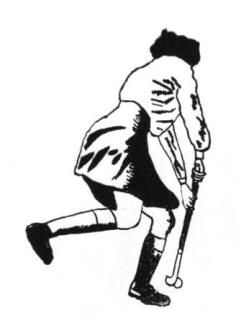
This year's Tal-Handaq hockey XI have only been playing as a team since September 1972.
As Tal-Handaq is the only senior Services School on Malta, we did not expect many fixtures, but we were pleasantly surprised. The team has had several matches against the nurses from Mtarfa, the Wrens and the Ladies Overseas team, plus a few others. We won the majority of our matches and found some of the team members forming a six-a-side team for a six-a-side hockey tournament; this was very tough.
Our first match was against the Wrens and we won 1-0. Then we played the Ladies Overseas team. There were a lot of corners in this particular match, and again we won 1-0, but only just! The last match was against some of our teachers and we lost 1-0.
Since our goal average was fairly high, we had to play the other Tal-Handaq teachers team in the final. We lost 2-0. This has been a good start, and we hope next year's hockey XI will be even more successful. FRANCES FRANKLIN
H. Cornner
SIX - A - SIDE HOCKEY TOURNAMENT - RUNNERS UP
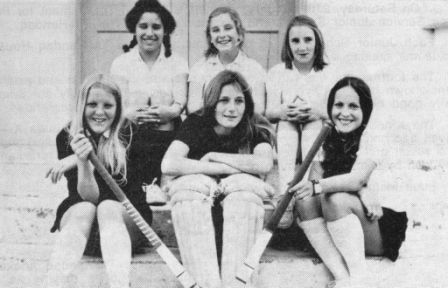
Back Row: Dorothy Sinson, Margaret Foster, Christine Smith.
Front Row: Jacquie Morris, Leonora Gallagher, Frances Franklin,
1st XI
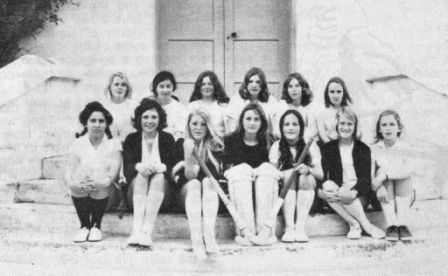
Back Row: Christine Daniels, Mandy Keating, Diedre Magill, Christine Smith, Caroline Fleming, Susan Barber.
Front Row: Dorothy Sinson, Jacquie Morris, Frances Franklin, Margaret Foster, Angela Alexander, Leonora Gallagher, Elaine Hessel,
SOCCER REPORT
1st XI
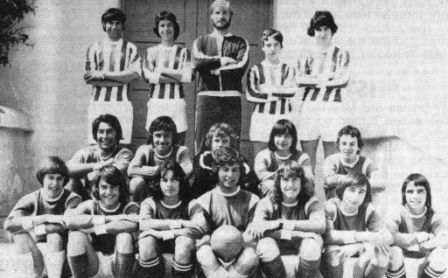
Back Row: S. Hopkins, K. Yull, Mr. T. Ricketts, T. Latham, D. Phillips.
Centre Row: T. Agius-Ferrante, J. Dennis, S. Dunn, M. Smith, M.Norman.
Front Row: P. Brankin, E. Smith, P. Darmody (v/capt.), S. Ward (capt.), C. Beer, B. McVeigh.
The School soccer XI can look back upon the season with mixed feelings. It has been a season of trial and error, but none-the-less, valuable experience 'has been gained. Although our league record of
P 17
W 2 D 2 L 13 FOR 24 AGT 78 PTS 6is nothing to be proud of, we can at least say we played some good, exciting soccer. During the course of the season, it became clear that we were one of the most skilful teams in the league; unfortunately these skills could do nothing against the strength of our adult opposition.
The two games we won were against 'G' Co. (Commando) and Mtarfa. Against the Commandos, we defended well in the first half, and took a 1:0 lead by half-time. With a strong wind behind us, the second half was one way traffic, and P. Darmody with two brilliant goals led a four goal assault.
Against Mtarfa, two own goals contributed towards a 4:1 win by the school. Good games against H.M.S. St. Angelo, and U.K. Civilians (2:6 and 2:8 respectively), were followed by two excellent draws, v. Luqa Eng. Wing and Ops. Wing both 2:2.
The difference in physique between ourselves and the other teams, brought us some small compensation in the shape of the Sportsmanship Trophy, which was won convincingly.
Throughout the season M. Smith, M. Norman and S. Ward played consistently well, and fully deserve their full school colours. School half colours were awarded to P. Darmody, T. A-Farrante, T. Smith and P. Brankin the school's leading goal scorer. Amongst those who did not receive honours but played well, were T. Latham, one of the most skilful players in the league, J. Dennis, one of the hardest tacklers, and D. Phillips.
Finally, on behalf of the team, I would like to thank Mr. T. Ricketts for his help and encouragement throughout the season.
Next season with a year's experience behind us we hope to be a more forceful side in the hunt for top honours watch out U.K. Civilians!
The school played five friendlies, mostly against visiting ships' teams. Indeed the school's first game of the season was won 6:0 against H.M.S. Intrepid, but even so this victory promised little.
S. WARD (Capt.)
1ST. XI v. STAFF SOCCER
On the 3rd May the staff met the school in their yearly encounter. A large crowd turned up to watch the match. The game started at a quick pace, with the staff settling down first. It was the school that made the first real attack, when P. DARMODY picked the ball up on the wing and crossed for the on rushing E. SMITH to just hit wide. Then P. WRIGHT picked the ball up in midfield and sent it through to J. BONNER, only for 6. DUNN in the school goal to dive at his feet, and prevent a certain goal.
In the 11th minute the school took the lead when the staff goalkeeper misjudged a back pass from his defence. The ball fell to the on rushing P. BRANKIN who hit the ball towards an empty net, only for one of the staff to clear off the line. The ball again came to P. BRANKIN who that time made no mistake.
The staff then began to pressurise the school defence and J. BONNER unleashed a terrific shot only to see the shot skim the bar.
The staff then gained a free kick outside the area and the ball was crossed into the area where S. WARD accidentally hand-balled. The referee MR. BEAUMONT had no hesitation in awarding a penalty which p. WRIGHT hit past S. DUNN to equalise.
It was now the school's turn to attack. M. SMITH pushed the ball through, P. DARMODY picked it up, rounded a defender and laid the ball on for P. BRANKIN, who hit a shot from outside of the area which just went over the bar. From a goalkick the ball went to J. GLOVER who sent it away to J. BONNER. This time J. BONNER made no mistake. When half time came the score was 2-1.
The second half started with the school determined to get an equalizer, but the staff defence led by T. RICKETTS was unyielding. An early opportunity fell to C. BEER for the school but his shot was blocked by D. DITCHAM in the staff goal. M. NORMAN then had his shot just miss the target. The staff then retaliated when P. WRIGHT sent away BONNER who, after beating four defenders, saw his shot just go wide. M. NORMAN was brought down and from the free kick he hit the bar. With time running out the school launched another attack. S. WARD controlling the ball well, pushed the ball through for T. SMITH to hit a low shot at goal. D. DITCHAM made a great save but did not hold it, the ball ran out to P. parmody who slotted the ball into the net to equalise for the school. With five minutes to go the last chance of the game came to the staff. The ball came to J. BONNER who hit a great shot only to see S. DUNN make a magnificent save and turn the ball to the corner. The match ended in a 2-2 draw.
With this draw the staff kept their unbeaten run against the School team for the past eight seasons.
Despite the inconclusive result the match turned out to be quite enjoyable for both staff and school teams
.P. DARMODY. Vice Capt
INTER-HOUSE COMPETITION 1972-73
SOCCER
|
SENIORS |
||||
|
TEDDER |
2 |
V |
ALANBROOKE |
4 |
|
ALANBROOKE |
5 |
V |
TEDDER |
0 |
|
TEDDER |
1 |
V |
CUNNINGHAM |
1 |
|
CUNNINGHAM |
1 |
V |
TEDDER |
2 |
|
CUNNINGHAM |
0 |
V |
ALANBROOKE |
2 |
|
ALANBROOKE |
3 |
V |
CUNNINGHAM |
0 |
|
TABLE |
PTS |
|||
|
1. |
ALANBROOKE |
8 |
||
|
2. |
TEDDER |
3 |
||
|
3. |
CUNNINGHAM |
1 |
||
|
COLTS |
||||
|
TEDDER |
7 |
V |
ALANBROOKE |
1 |
|
ALANBROOKE |
1 |
V |
TEDDER |
1 |
|
TEDDER |
7 |
V |
CUNNINGHAM |
0 |
|
CUNNINGHAM |
1 |
V |
TEDDER |
1 |
|
CUNNINGHAM |
3 |
V |
ALANBROOKE |
0 |
|
ALANBROOKE |
2 |
V |
CUNNINGHAM |
3 |
|
TABLE |
PTS |
|||
|
1. |
TEDDER |
6 |
||
|
2. |
CUNNINGHAM |
5 |
||
|
3. |
ALANBROOKE |
1 |
||
|
JUNIORS |
||||
|
TEDDER |
0 |
V |
ALANBROOKE |
0 |
|
ALANBROOKE |
2 |
V |
TEDDER |
1 |
|
TEDDER |
1 |
V |
CUNNINGHAM |
2 |
|
CUNNINGHAM |
2 |
V |
TEDDER |
3 |
|
CUNNINGHAM |
2 |
V |
ALANBROOKE |
1 |
|
ALANBROOKE |
2 |
V |
CUNNINGHAM |
3 |
|
TABLE |
PTS |
|||
|
1. |
CUNNINGHAM |
6 |
||
|
2. |
ALANBROOKE |
3 |
||
|
3. |
TEDDER |
3 |
||
|
OVERALL POSITIONS |
||||
|
PW
|
D L F A |
PTS |
||
|
1. TEDDER |
12 4 |
4 4 26 20 |
12 |
|
|
2. ALANBROOKE |
12 5 |
2 5 23 22 |
12 |
|
|
3. CUNNINGHAM |
12 5 |
2 5 18 25 |
12 |
|
|
HOCKEY-BOYS |
||||
|
COLTS RESULTS |
||||
|
ALANBROOKE |
0 |
V |
CUNNINGHAM |
3 |
|
ALANBROOKE |
1 |
V |
TEDDER |
1 |
|
CUNNINGHAM |
1 |
V |
TEDDER |
0 |
|
JUNIORS RESULTS |
||||
|
ALANBROOKE |
0 |
V |
CUNNINGHAM |
2 |
|
ALANBROOKE |
1 |
V |
TEDDER |
2 |
|
CUNNINGHAM |
0 |
V |
TEDDER |
0 |
|
OVERALL POSITIONS P W D L F A PTS |
||||
CUNNINGHAM 4 3 1 0 6 0 7
TEDDER 4 1 2 1 3 3 4
ALANBROOKE 4 0 1 3 2 8 1
BASKETBALL
SENIORS
ALANBROOKE 44 V CUNNINGHAM 24
CUNNINGHAM 36 V TEDDER 8
TEDDER 22 V ALANBROOKE 50
COLTS
ALANBROOKE 33 V CUNNINGHAM 36
CUNNINGHAM 29 V TEDDER 30
TEDDER 26 V ALANBROOKE 28
OVERALL POSITIONS P W D L F A PTS
ALANBROOKE 4 3 0 1 155 108 6
CUNNINGHAM 4 2 0 2 125 115 4
TEDDER 4 1 0 3 86 143 2
CROSS COUNTRY
(First four only, shown in each group)
|
SENIORS |
COLTS |
JUNIORS |
|
1 M. Smith (A) 2 K. Clayton (C) 3 S. Ward (T) 4 M. Lees (A) |
C Ansell (C) J. Dunn (C) M, Lovett (T) R. Knight (C) |
C, Venables (T)
A. Daniels (T) G. Lowe (T) D. Jump (A) |
|
1 Alanbrooke 46 pts 2 Cunningham 62 pts 3 Tedder 64 pts |
1 Tedder 50 pts 2Cunningham 54 pts 3 Alanbrooke 73 pts |
1 Tedder 46 pts 2 Alanbrooke 52 pts 3 Cunningham 75 pts |
|
OVERALL |
PLACINGS | |
|
1st TEDDER 2nd ALANBROOKE 3rd CUNNINGHAM |
160 pts 171 pts 191 pts |
|
|
ORIENTEERING COMPETITION |
||
|
Saturday 27th January 1973 |
|
|
|
1st TEDDER 2nd ALANBROOKE 3rd CUNNINGHAM |
64 pts 59 pts 57 pts |
|
GIRLS HOUSE HOCKEY
The House Hockey Championship was played during the Spring Term on three consecutive Saturday mornings. The Championship was divided into two sections Juniors (1st, 2nd and 3rd years), and Seniors (4th, 5th and 6th years). Each house played the other two in both sections.
Conditions were not ideal as on two of the three Saturdays there was a strong wind blowing which created quite a dust storm on the Cor-radino pitches.
Play in the Junior Section was of a good standard and some budding hockey players were spotted. The standard in the Senior Section was not as high, although perhaps it should be remembered that some of the girls praying had not played hockey previous to coming to Tal-Handaq, and even at Tal-Handaq some have not played very much, if at all. Thanks go to the house mistresses and senior pupils who got the teams together -also to the umpires of the matches.
The Championship Cup went to Tedder House and the results were the follows:-
SENIOR SECTION JUNIOR SECTION
1st Tedder
3 points 1st - Alanbrooke 3 points2nd - Cunningham 2 points 2nd Tedder - 3 points
3rd - Alanbrooke 1 point 3rd Cunningham 0 points
OVERALL CHAMPIONSHIP
1st Tedder 6 points
2nd Alanbrooke 4 points
3rd Cunningham 2 points
HOUSE NETBALL
The annual House Netball Championship was held during the Autumn Term - - matches being played on Wednesday evenings. The Championship was divided into three age-groups Senior (5th and 6th year), Intermediate (3rd and 4th year) and Junior (1st and 2nd year).
Enthusiasm wasn't lacking in any age<jroup and most matches were keenly contested. Each 'house played the other two houses in each age-group.
Thanks go to the three house mistresses and senior girls who organised the teams. Also to all the people who helped with the umpiring.
The Championship Cup went to Tedder House and the results were as follows:-
JUNIOR SENIOR
1st Tedder - 4 points 1st Alanbrooke - 4 points
2nd Alanbrooke 2 points 2nd - - Tedder - 2 points
3rd Cunningham 0 points 3rd Cunningham 0 points
INTERMEDIATE OVERALL CHAMPIONSHIP
1st Cunningham 4 points 1st - Tedder 8 points
2nd Tedder 2 points 2nd - Alanbrooke - 6 points
3rd Alanbrooke 0 points 3rd - Cunningham - 4 points
SCHOOL BASKETBALL
This year, Tal-Handaq suffered several set backs owning to the lack of experience, but eventually won four of the nine games which they played, Tal Handaq did not join any league but friendly games were fixed by the School squad and T. Ricketts. Five of the games were played at home, three were won.
The first seven games were played without any team work or determination. In the last two games, we finally played, as a team and I believe these were the best games played in the last two years.
The main team consisted of L. Bridwell, Clay Owens J. Callens, J. Shepherd, P. Brooker, B. Male and C. Ward.
M.C.A.S.T. 'B' 32 48
H.M.S. Intrepid 428
Stella Maris 39 59
Stella Maris 36 27
M.C.A.S.T. A/B 23 40
De la Salle 26 58
De la Salle 36 84
Jag's 60 40
Lyceum 60 55
L. BRIDWELL. Captain.
HOUSE REPORTS Alanbrooke Girls
September saw the start of a new school year, and for us at Tal-Handaq a new school. The first House-meeting showed a collection of unfamiliar faces staring with uncertainty at a group of equally unfamiliar House Mistresses. However the spirit of the House soon gripped everyone, and all contributed to making Alanbrooke's first year a memorable one. Enthusiasm was shown not only for the Sports side of the House but also in the various competitions throughout the year, and in a scheme for adopting a Children's Home.
The House Netball matches proved to be very exciting and encouraging this year, with each team playing to its utmost. The Seniors beat Cunningham by a 15-9 victory, and their match against Tedder was fast and eager with each team shooting to keep the score level until the last five minutes when Alanbrooke went into the lead to make the final score a 16-14 victory to Alanbrooke. Our thanks must go to Miss Lattimer for her time and energy in coaching us and without Miss Turner and her squad of supporters we would have been lost!
Unfortunately the Intermediates lost both their matches, although the Alanbrooke Tedder match was very close 10-9.
The Juniors thoroughly enjoyed playing their games and gave Tedder a very hard match. Unfortunately Tedder got the better of us by one goal, making the final score 3-2. We had less trouble against Cunningham, defeating them by 3-0. Overall Alanbrooke gained the pleasing result ol 2nd place. Congratulations to all the players,
Hockey this year was very successful for the Juniors. They won one of their matches, beating Cunningham by 3-0, and drew 1-1 with Tedder, thus winning their section.
The Seniors did not do at all well, losing to Cunningham 1-0, and drawing 0-0 with Tedder. Nevertheless with the Juniors' success, Alanbrooke managed to gain 2nd place overall.
Our thanks must go to Miss Turner for her guidance and encouragement and also to those who supplied refreshments.
One of the major events of the year was the Toy Making Competition. Although at first Alanbrooke had only five entries, encouragement from Miss Turner resulted in a massive production of toys and on the day of judgement; we were overwhelmed by entries. We cannot go on without thanking Debbie Holt, for her non-stop supply of toys which with their colour and originality, proved the mainstay of Alanbrooke's effort. Mrs. Wilson kindly agreed to judge the competition and admitted that the decision was a difficult one. Finally, owing to the originality and number of Alanbrooke's entries, we were declared the winners.
Our friendship with Saint Patrick s Orphanage was begun as a result of the toy-making competition. We decided to donate our toys to a children's home and Saint Patrick's Orphanage was chosen.
We arranged a Christmas Party for the boys on a Friday evening in January and supplied them with cakes and cookies made by the girls of Alanbrooke. A team of girls acted as waitresses and their presence was much appreciated by the boys, who rarely see girls. To add to the festive air, Father Christmas (John Bird) gave out our toys as presents to all the boys.
Since then, trips to the home have become regular, and the boys put on a pantomime "Aladdin", for us, .to show their appreciation. Alanbrooke also raised enough money, with the help of carol-singing Linda Hinde and her friends, to buy sixty-seven tickets for the school's production of "Oliver". The Saint Patrick's boys thoroughly enjoyed the show and enough money was left over to buy games of Monopoly and Ludo for the home. Our thanks go to Miss Turner and Miss Hill whose idea it was, and to all the girls who have contributed in any way to the home.
It is hoped that Alanbrooke will continue with the same spirit shown so far.
ANN PARTRIDGE GAMES CAPTAIN.
PHILIPPA KNIGHT HOUSE CAPTAIN.
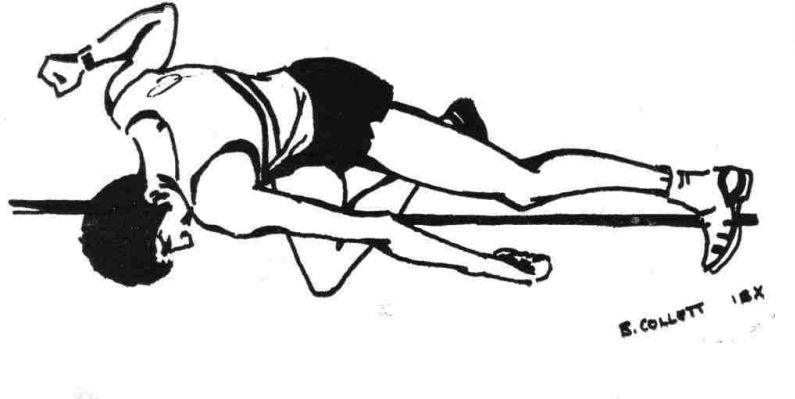
Alanbrooke Boys
SOCCER
We started the season with high hopes. The Seniors, we knew would do well as as large proportion of the team were school 1st XI members. In fact they won all their matches obtaining maximum points.
The first two matches were both hard fought affairs but we emerged 3-0 and 4-2 winners against uunnmgham and ledder respectively.
In the return matches in January the match against Cunningham was played in windy conditions but we managed two goals without reply. In the last match of the season Alanbrooke ran out easy winners by five goals to nil against Tedder.
Top scorer was Chris Beer with six goals. Other scorers were P. Darmody (3), M. Norman (2), P. Smith, M. Smith (1).
In the first two matches our Colts played,, they went down heavily 1-7 to Tedder and 0-3 to Cunningham. In the return matches we fared better holding Tedder (easily the strongest team in the school) to a 1-1 draw. Unfortunately we lost our match to Cunningham. In the last 6 mins. of time the opponents came from behind to win 3-2.
Scorers were G. Massam (2) C. Ward (2) Bartlett (1).
The Juniors were unfortunately fairly weak this year until Nankevil moved to the forward line and P. Kitson into midfield, with H. Cornner playing his usual safe role as sweeper. As so often happens in House Soccer, the team improved towards the end and would probably have done well if there were more games to play.
In the Minor League our first years were again one of the weaker teams but enjoyed their games, especially the final one, where we hauled ourselves off the bottom spot in the table by beating Verdala 1-0 with a fine fighting performance.
P. Darmody C. Ward
Capt. Seniors Capt. Colts]
Seniors
Alanbrooke Senior basketball team proved successful. The first game against Cunningham was close, but in the second against Tedder we proved our superiority. Thanks must go to Paul Brooker, Steve Dunn, Bill Male and Jake Shepherd who put in a tremendous amount of effort and practice. (Note from Mr. Ward The success of this team was a credit to Clay Owens who organised practices, cajoled, bullied, and encouraged his team to success).
Colts
Both Colts games were close, with the honours going to us against Tedder, while we suffered defeat against Cunnigham. In the last three minutes in the first match Cunningham scored two fast baskets to score 36 points to our 32. The second game was exciting although the score was low. We took the lead but only just held it, running out winners by 28 points to 26.
Many thanks to Jump, Easton, Bartlett, Calcott and especially Chris Ward, who worked tremendously hard to achieve success.C. Owens (Capt.)
COLTS HOCKEY
ALANBROOKE COLTS V. CUNNINGHAM COLTS HALF TIME 0-1 FULL TIME 0-3
As this was the first time that the Colts had played Hockey as a team, it was not surprising that -we lost. Cunningham scored in the first ten minutes with a goal from Enkel.
At half-time we were trailing 1-0. In the second half Cunningham scored twice more, bringing the full-time score to three goals to nil.
ALANBROOKE COLTS V. TEDDER COLTS
During this game we were all over Tedder as they did not have a full team. Tedder scored about 10 minutes after half-time. This made us more determined to score; we had a lot of chances but did not succeed until late in the game.
It was from a short corner that we eventually scored. Ward took it and Calcott shot, but the ball was deflected off one of the defenders. Then Jump shot and somehow it went in.
The full-time score was: Alanbrooke Colts 1 Tedder Colts 1.
Byron Bartlett 4L
CROSS COUNTRY
This year's cross country was held on a wet and cold day, yet this did not have any adverse effect on the Alanbrooke runners, who put up an excellent performance finishing second overall.
Mike Smith was first home for the Seniors having led all the way round the 5 mile course. He was followed into 4th place by Mike Lees. The first six runners were all home in the first 13 places which is a reflection on the good running support o»f the whole team.
The Juniors ran well as a team with P. Pitman, G. Bright, and R. McVeigh all coming in together.
T. Ferrante (House Captain)
ORIENTEERING
Our orienteering day began with thunder and lightning which fortunately cleared up for the start but left some of our team members stranded en route. However, the team performance was very good (despite ou: second placing) with everyone reaching their check points. Several minutes were lost at the start and this showed at the check-points where mostly second placings were marked up. However we had the honour of getting the first pair home Z Baker and T. Gault.
The girls showed themselves to be as competent as the boys at their map reading!
Our team comprised:-
A Partridge & P. Donvin
S Harris & A.Langford
M Lees & A. McConnon
S Duff & J. Allcot
G Edgell & J. Marshall
Z Baker & T. Gault
G Simister & R. McVeigh
M. Lees (Capt.)
Cunningham Girls
The first main event in which Cunningham girls took part, was the Inter-House Netball. Although the Seniors and Juniors were placed third in their respective matches, the Intermediates did very well, winning all their matches and gaining first place. The next event was hockey. The senior girls showed much enthusiasm in this. They played very well and more than deserved their 2nd placing. The Juniors unfortunately came third, although they played their games with zest.
The Inter-House quiz went off very well but, alas, Cunningham came third. They also came third in the toy competition.
However, all this apart, the House itself has shown much enthusiasm for all events and competitions, and we have had some very good assemblies taken by individual members of the House.
We are all looking forward now to the athletics and we hope to make up for our unfortunate past by winning as many events as possible.
Janet and I would like to say a big thank you to Mrs. McCafferty for all her help and we all hope to do her proud by winning these forthcoming events.
Carol Wilkins House Captain
Janet Hinde Games Captain
Cunningham Boys
So far this has not proved to be a very successful year for the boys of Cunningham House, the only major victories being the Inter-House Hockey Cup and the Services Schools Minor League Cup.
The outstanding performance was by the first year in the Minor League, which was decided by a single goal in the final league game against St. Andrews School. This proved to be a really excellent game in which the standard of football was extremely high. The side was very ably led by Billy Morris, who in the penultimate game against Verdala netted all seven goals.
The Hockey Cup was introduced for the first time this year, and involved the Colits and Juniors. Cunningham were unbeaten in this competition, and as a result, collected their first trophy in the Inter-House Competition. Although everyone involved played well, and to a very high standard, considering that most have only been playing Hockey since September, Enkel and Ansel I deserve a special mention for the Colts, and Taylor and Cornforth proved to be the outstanding players for the Juniors.
The Inter-House soccer competition provided a close finish; all three houses on completing their fixtures had twelve points. The winners on this occasion were Tedder who won by their better goal average. Black marks to the man who sent "little" Richard Lovell and David Stapely (centre-back and centre-forward respectively of the senior team) back home before we played Tedder seniors. The result of this was that we could field only ten players to play on ground which was more like the Somme battlefield, rather than Corradino 'A' pitch. On this occasion we went down 2-1, but if Stapely and Lovell had played, as they had done when we had previously drawn 1-1 with Tedder, we might have won the competition.
The Colts in spite of a heavy defeat in their first game, improved tremendously throughout the season, collecting valuable points against teams, who on paper, seemed much stronger. Ansell again proved to be the outstanding player, his strong tackling and good positional sense, dominating the centre of the defence.
The Juniors, who should have been our strongest side, had a mixed season. After winning both their games before Christmas, perhaps because of over confidence, failed to maintain their form, and lost valuable points which would have undoubtedly have won -us the league. We eventually finished last on goal average.
Cunningham did not do too well in the Inter-House orienteering held at Marfa Ridge, the House being placed overall third. Incidentally, my sympathy goes out to the boy (who shall remain nameless!) who lost his way on the course.
The Inter-House cross country held some surprises for us; the Colts did not do as well as was expected (in spite of the fact that our best cross country runners are amongst them) but it was a pleasant surprise to find that the Juniors did quite well. Cur best runner however, is in the Seniors: Keith Clayton, who was one of only two Cunningham runners to finish in the first ten of the Senior race: He came second whilst John Dennis finished eighth.
In the Inter-House quiz we finished third, but only a point separated us from second placed Alanbrooke. However all concerned (John Dennis, Jonathan Enkel and Jeremy Taylor) did their best.
In spite of our below par performance this year, Cunningham are capable of winning the Inter-House trophy next year providing there is more all round effort made.
My thanks are due to all the Cunningham boys who were picked and went to their matches including the substitutes, in particular Roger Slim and Geoffrey Simister. Finally I extend my thanks to our house-master Mr. Bonner for giving up his spare time to attend our practices and matches as well as for his encouragement.
John Dennis (House Captain)
Tedder Girls
Since the re-opening of the school in September various Inter-House activities have proved how "all together" the whole house is, The sport achievements came after masterly planned "press-gangings" and the hard work of the Games Captain, Gill Harris, to organize the assembled rabbles. The hockey was won despite various well-known cynicisms; the orienteering proved that good results can come from unexpected quarters and the netball showed that St. Trinian tactics do bear fruits worth gathering. The quiz was a superb display of un-paralleled guesses, and the toy competition showed why most people left the needlework class at an early age.However, the whole House seems willing to proceed undaunted into the future and the usual spirit of "comradeship" will no doubt prevail throughout the House if our customary luck continues. With a combined and unified effort Tedder girls will be able to win the events they lost this year and re-assert their supremacy by re-achieving this year's successes.
LYNNE MITCHELL. HOUSE CAPTAIN.
Tedder Boys
It has been a year to remember for Tedder House. Throughout the year's sports programme it has been Tedder who have shown the most consistent form. This consistency must surely bring its reward, the coveted honour House Champions. The boys of Tedder are proud of their House, and in order to maintain their supremacy they worked very hard, and it is very encouraging to see the House well supported. Unfortunately we have lost one of the scrool's most well known and liked characters Brian McVeigh, Tedder Boys' House Captain. We wish Brian all the best in his R.A.F. career. Although it has been team work that has put Tedder on top, there are several individuals who deserve special mention. In the Juniors: Venables, Lowe and Jump; in the Colts: Chris Laurie and Michael Crampton; and in the Seniors: Peter Brankin and Steve Ward.
The Inter House Soccer proved to be the most exciting event of all. Vne overall result was not made clear until the last game of the competition. With Cunningham beating Alanbrooke 3-2 (Colts), all Houses finished with 12 points, but, with a better goal average, Tedder were the winners. It was mainly owing to the efforts of our Colts XI that we were successful. In the first round, the Colts had 7-1 and 7-0 victories over Alanbrooke and Cunningham respectively. Missing M. Boyd in the 2nd round, the Colts were disappointing and could only draw 1-1 in their matches. The Seniors, despite half the school soccer team, were very disappointing. They lack depth and all round skills to be a dominating force. Despite beating the group winners Cunningham, our Juniors also had a frustrating season, but there is always next year.
The hockey competition was marked by the absence of the Seniors. Tedder's best hockey was played by our Juniors, for whom Jump and Venables were outstanding. Both played major parts in a magnificent 2-1 win over Alanbrooke, a game in which the opposition rarely got out of their own half. The Colts were rather disappointing, although they were unlucky to lose to the winners of the Colts section, Cunningham. Chris Laurie, Paul Smith, Michael Crampton and Michael Vietch deserve special praise for their play.
Each of the three Houses was missing key runners in the Orienteering competition, held at Marfa Ridge, last November. Persistent rain had daunted many, but by the time the competition began, glorious sunshine made it a day to remember. There were 12 check points in all and each had to be visited as quickly as possible. The aggregate times were added together, and Tedder were the fastest to visit all checkpoints, some 25 minutes ahead of Alanbrooke. Praise must go to all the Tedder runners, but in particular to Michael Vietch and Steven Ward, who covered most of Marfa Ridge in going to their 3 checkpoints. From the girls who took, part Angela Sellers and Margaret O'Brien deserve specia1 praise for their great effort.
In the Junior section of the Cross-Country championships, there was it seemed, only one team in it Tedder, who filled the first four places.
Venables was the winner, Daniels 2nd, Lowe 3rd and Jump 4th. This was a magnificent effort, and on a dull, rainy day hopes of our Colts and Seniors soared sky-high.
In the Colts race Mark Lovett finished 3rd for Tedder, and the rest of the team followed him home and ensured a resounding win for Tedder.
The Seniors unfortunately did not follow our Juniors' and Colts' example and finished last overall. Steven Ward (3rd), Peter Brankin (5th) and Tony Smith (6th) could not sway the result. Happily though Tedder still won the overall cross-country Championship.
To prove that we are indeed the Champion House, the Inter-House Quiz was won by none other than Tedder. Starting slowly in the opening two rounds, Tedder streaked ahead in the remainder to win very convincingly from Alanbrooke.
All told it has proved to be a most successful year for Tedder, and our prospects in the Summer games are very high so here's hoping.
HOUSE CAPTAIN BRIAN McVEIGH. REPORT WRITTEN BY STEVEN WARD.
INTER-HOUSE CHAMPIONSHIP POINTS TO DATE
|
Alanbrooke |
Cunningham |
Tedder |
|
| SOCCER |
4 |
2 |
6 |
|
CROSS COUNTRY
|
4 |
2 |
6 |
| ORIENTEERING |
4 |
2 |
6 |
| BASKETBALL |
6 |
4 |
2 |
| HOCKEY (BOYS) |
2 |
6 |
4 |
| HOCKEY (GIRLS) |
4 |
2 |
6 |
| NETBALL |
4 |
2 |
6 |
| ATHLETICS | 4 | 2 |
6
|
|
32 |
22 |
42 |
TENNIS, CRICKET, CRICKET (6 a side), SWIMMING - NOT YET DECIDED
Cunningham
Winners of the Services Schools Minor League
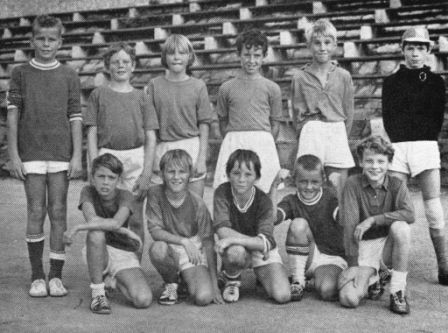
Standing: G. Pape, K. Lovett, A. Keating, G. Sinister, B. Cottam. A. McKay.
Front row: A. Howse, N. Boyle, B. Morris, A. Tulloch, G. Cleave.
Also played: V. Vickers, L.Young.
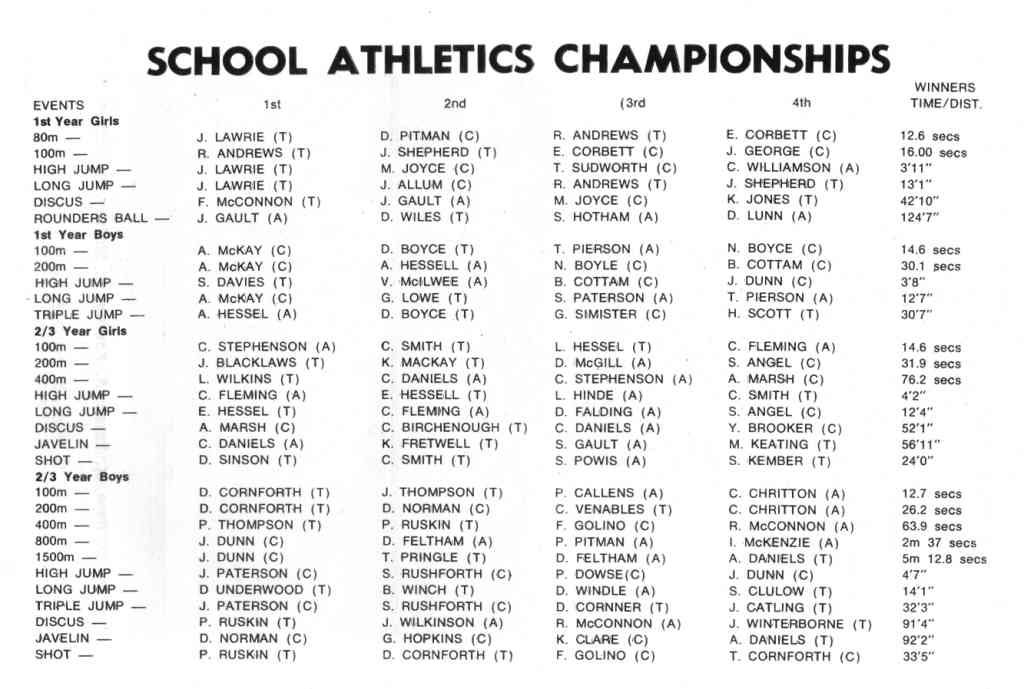
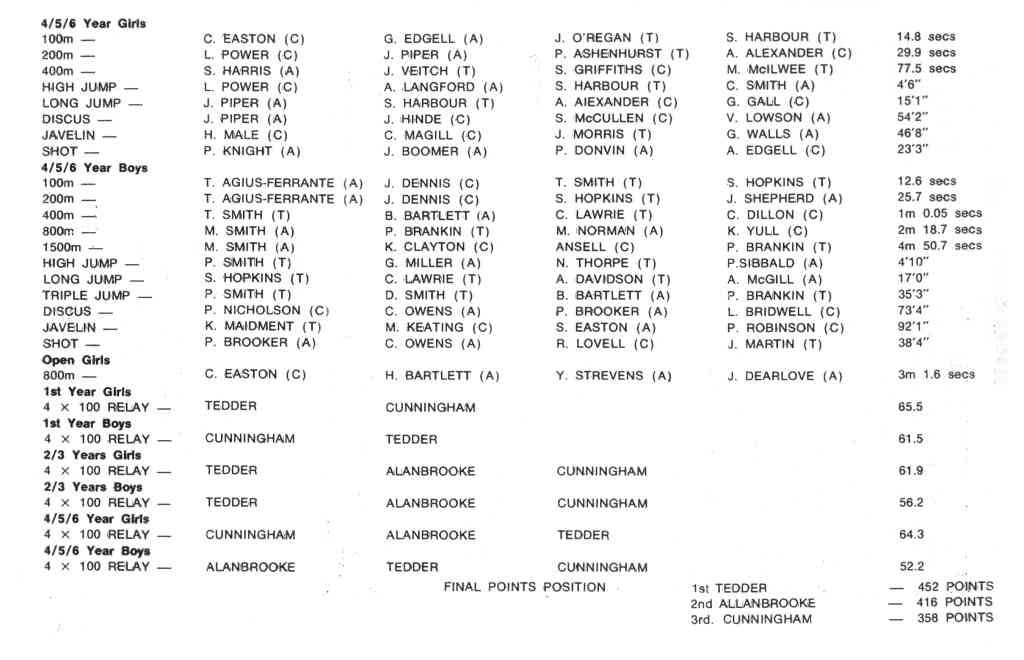
BEFORE DAWN
The clock has stopped at ten to four, And more can One's imagination Contrive at this event, in the timeless Early hours, than to wait for day?
This muffled world is pale and still: A time to be born, a time to die, But not to kill, for what could dream Of blood at such a pallid hour, When thoughts are sunk grey bubbles?
How many others wait like this, alone but For each other, in the early morning air, Not counting, resting silences, taking Chance on solitude, till joining in the day;
Then start again, where we would Have done the night before, the Morning after, as if the in between time Had never crossed our minds?
LINDA ROSS L6th
|
MAKERS OF WAR Makers of war go, Go from my sight. It is painful for me To look upon you, To see you, To hear you. Makers of war, Begone now, you For my mind is turned against you The evil in me Welcomes you, Like an old pool of stagnant water Welcoming bacteria and germs. Makers of warWhy do you seek to infect my mind With evil? You who would harm me, And bring A great sickness To my brain, I loathe you. So Begone you foul creatures Before the infection spreads. Philippa Reiss 5U
|
LOVE'S LAMENTMemories in my head, Of my love for you, Tears in my eyes, For the love that was true, Love in my heart, Which you didn't see, For your love was for her, And not for me. Paula Smith L6G
|
A DAY IN THE LIFE OF A VILLAGE
It was a cold day, and the postman pulled his coat around him. It was seven o'clock and nothing broke the silence of the new morning. He turned in at the first gate and pushed the letters through the. box. He would do this for another hour, and he would cover almost every street in the village. The sun did not show above the buildings. He. stopped and listened. Not a sound broke the deathly silence. He sighed. He almost knew the streets blindfold. He did the rest of the houses in the street and turned the corner. He went down the high street and pushed more letters down more boxes. The sign of a bull, whose presence indicated the butcher's, swung gently in the wind. The postman turned down another road and disappeared from view.
Then at eight o'clock a man started running towards the railway station. He ran quickly down the steps toward a train. It was just gathering speed as he got down to the bottom of the steps. Disappointed, he started walking over to the waiting-room. Life was now showing in the village. More people appeared on the high street The shops were also starting to open. The sun now showed above the buildings. A car drove down the high street. A few people turned to look at it, but most of them ignored it. But the rush of people thinned out as more and more of them got on trains. Soon only a few women wandered along the road, gossiping and window-shopping. At nine o'clock a few still remained. More cars were on the road now.
The traffic lights blinked their unseeing eyes in the rhythm they would always blink. Some distant cars honked like angry geese. Then at noon the shops started to shut. The butcher's bull stood silently at its post. The streets were almost deserted now except for a few people coming back from the shops. They remained deserted except for the occasional car.
Then at four o'clock the shops started to open again. More people appeared, but they had come off the trains. There was a rush of these people for about five minutes, and then they thinned out. Soon it was getting dark. One by one lights appeared in windows. Some of them went on and off, advertising nameless firms which sold nameless products. Cars looked around with blazing white eyes and roared off into the darkness. But the lights in the village soon blinked off as their owners went to bed and sleep. In a few hours the village was sleeping.
Soon another day would start.
CHARLES ARTHUR, 1AY.
BROKEN LANDSCAPE
Travesties of time Begin again, With The vaporous Rise of morning
Cold, Creep and crawl to Fix The sunlight With a needle;Fly Sky-high Through this daydream Of life.Then
THE VILLAGE SHOP
The frosty wind bit my face and hands as I stepped onto the white-washed step of the village sweet shop which was welled in the centre from constant cleaning. I paused and glanced up at the ancient sign. It was written in an elaborate hand and creaked and swayed.
I stepped in and the warm tinkle of the shop bell greeted me. The air was heavy with a musky odour. Sugared glass jars glistened curiously in the half light. A tiny figure peered from behind the great oak counter but soon scurried away at the sound of a boiling kettle.
A cat sat languidly in one corner gently waving its tail. There was shelf upon shelf of sweets. Nothing ever changed. Hard sweets were on the left, soft sweets on the right and all sorts in the middle. The white walls were always hiding and could only be seen where they ran for the safety of the ragged, discoloured curtains and the dim shadows of the windows.
The counter was antique, carved with strange shapes and flowers. I stepped onto the little platform before it, so as to peep over the top and catch a glimpse of what lay behind.
There was a host of jars with fresh stocks in them and, because it was approaching Christmas, there was a pile of colourful paper bags for sweets to be given as a small gift. There was a neat ball of rough, thin twine and I could almost hear the "ping" it would make when it was cut. A pot bellied sack of chestnuts seemed to grin at you while rosy-cheeked apples winked and shone. I had always wondered where the till was and now a tiny group of columns had caught my attention. On a large tray there were several brown and silver towers. I could not make them out at first but after a while I gave a slight jerk as I realized that all the shop's takings for the day were kept on the tray and any change needed was also taken from there. At first I thought it a silly idea but the thought of a modern till seemed worse. Stepping off the platform, I took another look at the empty counter top. Then I stood for a few seconds gazing at the ceiling.
This showed the real age of the building. Dark beams ran across from wall to wall and in between there were patches of grey-white. I could never tell what this was, perhaps dirt or perhaps the shadow cast by a neighbouring beam.
Having forgotten my reason for calling, I turned quickly, making a squeak on the floor. As I opened the door I heard a shuffling behind me. I looked back to see the old lady peering through her spectacles. There was something Puritanical about her; she wore a long, grey dress with tiny pin stripes of darker grey and a white collar with a brooch. Her white hair was brushed into a bun and her gold spectacles, which were balanced on the end of her nose, blinked in the gloom of the shop.
She looked at me questioningly but I reached for the door and gave a half-hearted smile.
"Not today, thank you," I said.
ANNE DOWIE 3D
A SCENE DURING THE FLOOD
Water covered every square inch of the world. Jagged lightning spread its forked hand across the sky. Enormous waves broke over unseen reefs. There was a booming thunderclap.
Rain splattered the window. Every stone, every bush, every tree was submerged beneath the ubiquitous water. For twenty days and nights this had gone on and on.
In the morning (distinguishable by a weak sun rising behind gigantic storm clouds which covered the sky) rain poured ceaselessly down, bombarding the gigantic expanse of water that was the Earth. The ark drifted aimlessly around like a twig thrown in the middle of a lake.
CHARLES ARTHUR, 1AY.
|
A VISIT TO A WILDERNESS Misshapen tree-stumps . Scatter the landscape, Wreathed in a white mist That spreads over the earth like a Parasitic fungus. The stumps are blackened with soot, and Seem to writhe in agony from the tongues Of flame that have bent them into Parodies Of what they once were. T he ground between is rusty, Discoloured by the minerals in the soil, And no green life sprouts from it. Even the sky seems dead Devoid of all life It is the dull metallic gray Of steel That shrouds the dying planet. And straight, JANETTE ROSS 5L
|
THE WIND The wind is so strong on a stormy day, Lashing the Willow just like a whip, Holding me in a breathtaking grip. Whirling the leaves in a furious spin, Oh, he's such a bad tempered thing. He huffs and he puffs and he roars on the way, Look! He's blown my best hat away. Tossing trees and bounding away, Howling round corners, Brushing the sea, Tumbling tiles and twirling me. K. FAIRMAN 1 BY Live it, Love it, Be it, Till the slow-quick end, When The mumbled, Jumbled, Tick-tock, Sick Clock, On the warped walI of this cell Slides into a broken landscape. LINDA ROSS L 6th |
INTO THE DARK BEYOND
I shivered violently as I looked down into the deep, murky water. I cut the engines and tied the boat to a rock jutting up from the water. Everything was silent; I waited a few moments, then took the aqualung from underneath the canvas. I pulled it onto by back and fastened it on tightly. I closed my eyes, and jumped...
Minutes later I was swimming through the weeds which grew on the sea bed. My Vision was blurred, I could hardly see at all. My hand gripped the small torch in my belt; I took it out and pressed the switch. Nothing happened! I began to panic. Soon I would reach the area where the cave was; if I had no torch, I would never find the entrance. I stopped swimming and began to take the torch apart. The bulb had run out, the torch was of no use to me now. I buried it carefully between two dumps of weed. I didn't want anyone to know I had been here yet. Now my problem was how to find the tunnel. I had no source of light at all. My only chance was to swim next to the cliff face which was under water, and feel for an opening. For the next five minutes I searched for the opening it seemed like eternity. Suddenly I lost my temper. I had worked for years planning this, now it was going to fail. And all because of one faulty torch. I lashed out at the cliff as if trying to knock it down; I grabbed hold of a weed and tried to pull it out of its bed. In doing this my hands slipped and lurched round a corner, pulling the rest of me with it. I found myself in a thin cavern or was it the tunnel? Continuing through the narrow gap I realized that this was indeed the tunnel which I sought. At last freedom was within my grasp. Excitement welled up inside me and I jubilantly raced into the darkness beyond. But at the end was the brightest light that could ever shine for me. Freedom!
DIANNE C. LYONS 1 AY
THE MURDEROUS FLOOD
The lightning flashed and the thunder rolled. Large rain-drops fell from the heavy clouds. Thunderbolts streaked across the sky and burst on impact, with ear-splitting noises that reverberated through the hills. Then it shed its lurid green light over the petrified animals and birds on Earth. The wind shrieked and roared, whipping up clouds of dust, uprooting trees and houses and taking debris with it.
Suddenly the flood gates of heaven opened and down poured a torrent of water. Swirling masses swept down hills, joining others. The storm raqed on for forty days and forty nights. Then God closed the gates of heaven, as the water reached higher than the highest mountain on Earth. The flood started to sink and the winds were stilled. And God sent a rainbow to show Noah that his wrath had abated and that peace would be re-stored to the Earth
FIONA McONNON 1 AY
|
PAIN Sudden searing through your mind, Brain drumming madly Finger throbbing, cut so badly, Such is pain
CHARLES ARTHUR 1 AY
THE WILD HORSE. Through the darkness and through the rain, Hoof beats drumming again and again, Ghostly outline passing by, Galloping under a darkened sky. Hoof-beats ringing on rock and stone, The riderless horse gallops alone, Over hill and over dale, Wildly swishing his flowing tail. Mary McGrath
|
SOMETHING LOST, NOTHING GAINED Singing through the mud-flats Of his mind, Squelching underfoot his life, His loves and deprivations; Walking on past empty skeletons of once Bright hopes. Passing down countless corridors Of forgotten dreams and dusty volumes of Deadly hates; He reached the core. He stopped and stared and sought Through the banks of faintly echoing
Memories The clue to his existence. But it was gone, it was not there. Desperately he retraced his steps To see if, unthinkingly, tie had dropped it On his way through life:- Not realising what he had lost until It was too late But it had gone. It had withered and wrinkled away into Some misshapen gargoyle ,of Truth. He could not decipher the smudged meaning, He was too weak, too weary, To bother anymore. But it nagged him, cursed him, for not preserving it and For not using it When he needed to. And so he died, In blank Darkness. Janette Ross 5L |
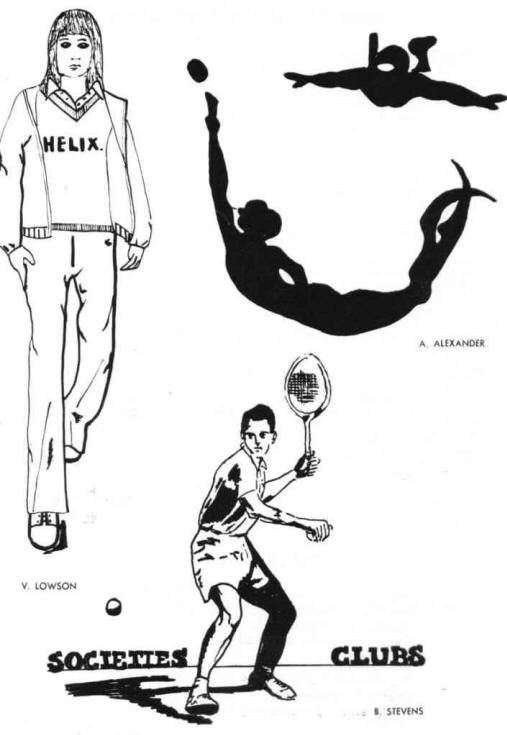
SAILING
Sailing did not start until January and then only a few from the 5th and 6th years were lucky enough to go. All of us were very 'keen and bad weather has only deterred us twice. At first only three Bosun dinghies were available. Now four Bosuns and two Sailfish are on the water.
The afternoon starts at 1.30 p.m. with a joyous bus ride to St. Angelo. When St. Angelo is reached, dinghies and crew meet and sails start rising. In about twenty minutes the first boat is launched. Since this is done without the aid of launching trolley or crane, the muscle power of our strong boys is much appreciated.
In the first half of the term Jeremy Jackson-Sytner and Ann Partridge were awarded C helms, while Roger Slim and Philippa Reiss received B helms. A couple of weeks later Carol Easton and David Freedom received their C helms.
Capsizing the boat was included in our training. Many thanks to Carol who won the honoured award of first ducking. Our novices Amanda Packshaw, Debby Bussel and David Sweet should also soon gain their C helms, we hope
Last year I sailed with MANSC at Pieta. I am glad that they have moved to Grand Harbour which gives us a larger sailing space in the centre, and an opportunity to explore the creeks. Moreover, Grand Harbour is less smelly than Pieta.
Because of our training we have not had much chance to race each other. While speaking of training a word of thanks is due to our two trainers, Mr. Ward and Mr. Naylor who, I am sure, enjoy Friday afternoons as much as we do.
PHILLIPA REISS
HELIX
Friday, 24th November saw the re-opening of the Helix club after many weeks of painting, re-arranging, sweating and swearing by the Sixth Form committee. "D's Disco" provided the music for the evening and it seemed that everybody enjoyed themselves.
The dance we held at Christmas went very well with the local group "Slug" playing for us. Although it was a pleasant change to have a "live" group, we have since found that the discos are far more popular.
We also held a Valentine's dance in February, and from the starry-eyed expressions around the school we gather that Cupid was very busy with his bow and arrow that night!
Since then the dances have all been successful with "Alco Disco" playing for us.
However, now that the Easter holidays are over and friends and relations have returned to England, we find that the attendance is slowly waning. If it continues in this way we will have to close the club down owing to lack of finance.
May I say a big thank you to Mr. Glover for all his help and for kindly giving up his Friday evening to come to the club, also the other members of staff, Miss Lattimer, Miss Stansfield and Mr. Ritchie.
Don't forget, members, the Helix is for you so support it.
CAROL WILKINS CHAIRMAN
JUDO
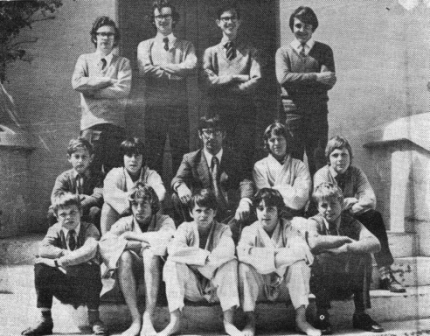
Back Row: M. Lees, P. Macgregor, G. Simister, K. Maidment.
Middle Row: M. Hilton, I. Jump, P.O. B. Blyth, J. George, M. Calcott.
Front Row: P. Jones, T. Calcott, J. Dunn, J. Taylor, S. Jones.
Our club had an excellent start with a mixed group of twenty in the seniors and a dozen in the juniors. The classes were juniors on Thursday after school and seniors on Friday afternoon during games. By the end of the first term there were many who had decided not to continue. This left Jean Boomer, Michael Lees, Peter McGregor, Kim Maiden and G. Simister in the senior group, while most of the juniors remained. The second term saw much hard work and its rewards in the 'grading', with Taylor and Dunn from the juniors obtaining an orange belt in their first exam. Jean also obtained an orange belt. A recent competition of four judo teams saw an excellent performance by our juniors and seniors which placed the team in second place overall, out of and against more experienced and heavier opponents.
On behalf of the club I thank our Judo Master P.O. BARRY BLYTH 1st Kyn and TONY TANTI 1st Kyn for their teaching and free time which they have given to the club. And many thanks to Mr. RICKETTS for his support throughout the year.
MICHAEL LEES
Deputy Head Boy
GYMNASTICS
This year, a new venture has been tried out in the gymnastic field, which has proved very successful and worthwhile, in spite of our modest facilities and apparatus. This has been the participation of all girls, up to and including the fourth years, in the British Amateur Gymnastics Association Award Scheme. The scheme is devised by the B.A.G.A., and sponsored by the Sunday Times Newspaper in U.K. This scheme has been running successfully in Great Britain for a couple of years.
There are four awards in the scheme numbered four to one Award 4 being the easiest and Award 1 the most difficult. In each award there are ten exercises seven floor and three apparatus. To pass an award, each participant must successfully complete a minimum of six exercises. Each girl may have as many tries at each exercise as she likes. The following shows what is included for each award:
|
AWARD 4 1. Forward roll
10. Squat onto and jump off box
|
AWARD 3 1.Astride sitting Circle roll to opposite direction 2.Headstand with straight legs 3.Backward roll to astride 4.Cartwheel 5.Handstand 6.Forward roll to standing 7.Standing upward, jump with full turn 8Diagonal vault one leg take-off- 9.Tucked jump upward from box top 10.Straddle vault over buck or broadways box
|
|
AWARD 2 legs to straddle through handstand bridge 10. Neck spring box broadways
|
AWARD 1 and stand ways ways 10. Kick to handstand hold for 3 seconds
|
So far we have worked our way through Awards four and three and results have been very encouraging. Next year, we hope to move on to Awards two and one. One of the 178 taking Award 4 173 gained a pass and of the 191 taking Award 3 126 gained a pass.
Special mention should be made of 40 girls who passed ten out of ten in Award Four (27 of whom were 1st Year Girls) and the 13 girls who passed ten out of ten in Award Three. The latter were:
Fourth Years Susan Harris and Louisa Power.
Third Years Christine Smith, Susan Gault, Sarah Mannings, Christine Daniels and Ann Dowie.
Second Years Denise Falding, Helen Bartlett and Jacquie Dearlove.
First Years Jacquie Gauit, Janine Laurie and Ruth Andrews.
Badges are obtainable for each award at a cost of 25p each from the B.A.G.A. through the school.
SNORKELLING
During the Autumn term, Mrs. Manley Harris took a group of eleven people for a course of snorkelling instruction. The course lasted eight weeks with two lessons per week on a Tuesday night there was the snorkel instruction at Corinthia Palace Pool, and on a Thursday night we had oral instruction.
At the Corinthia Palace we learnt how to use properly flippers, mask and snorkel tube; swim with a weight belt; dive with snorkel equipment to retrieve an object from the bottom of the pool; a surface dive; life save a person in the water and give artificial respiration.
The oral instruction consisted of lessons on snorkelling equipment, dive techniques, hyperventilation, respiration, protective clothing (wet and dry suits), exhaustion, signals and diving holidays.
There were three snorkel swimming tests. The first was a test of basic swimming ability. We had to swim on front and back, swim with a weight belt, tread water, float and retrieve an object six times.
The second test was a test of ability using basic equipment. After sinking and retrieving equipment, we had to put it on in the water then fin, surface diving every 25 yards. We then had to tow a person, give Expired Air Resuscitation in the water, land the body and continue Expired Air Resuscitation on the pool side. After doing three forward and three backward rolls in the water, finning 15 yards under water, we had to hold our breath for thirty seconds under water.
The third test was one of stamina and ability to cope with conditions that can lead to exhaustion. After finning 50 yards wearing a weight belt, the weight belts were released in the deep end and masks removed, and we finned a further 50 yards using snorkel tube but no mask. At the deep end once again, equipment was refitted and with weight belt on we gave the OK signal and finned 50 yards again.
After the swimming tests, there was the written exam. Questions were asked from notes we had taken during the oral instruction. Eight people completed the course and passed the exam. They were:
Carla Sinson (4th), Helen Male (4th), Keith Naylor (3rd), Susan Dearlove (4th), Steven Gallagher (3rd), Simon Rushforth (2nd), Kevin Clare (3rd) and Daryl Cornner (3rd).
Susan Dearlove 4M
D of E EASTER CAMP
We had planned, packed and repacked for our weekend venture into camping, and by 16.30 hours on Friday 16th March the coach taking the candidates for the Duke of Edinburgh's Award Scheme was winding its way to Ghajn Tuffieha, our camp site. Perhaps this concrete army site with its odd patches of gorse and grass was not the most ideal place for our first camp but undaunted, everyone pitched tents, then prepared their evening meal of soup, bacon, baked beans and other rare delights before darkness fell. A little difficulty such as the huge mound of grass where one's sleeping bag lay was quickly overcome but a major concern, which was unsurmountable, was the position of the site, for the valley was a wind tunnel with our camp site as the focal point for blasting.
That night some of us managed to catch some sleep, while many others intent on walking their sixteen miles before daybreak, scoured the environs of the army site and succeeded in attracting the somewhat noisy attention of every hound-dog within range. But on the Saturday, these hardy followers of the Duke of Edinburgh shouldered their packs and trekked their way round the north of the Island in bitter howling winds.
We returned from our hikes about mid-afternoon and immediately sought the protection of the empty army huts to cook and to make our camp for the night. Indeed such was the success of this indoor cooking that the kitchen hut became a meeting place; it also provided a good coffee service brewed by the 5th form boys and was the scene of a cooking stove repair service. At nightfall some campers scorned the shelter of the huts and returned to their tents. Sadly this honour could not be kept for within two hours, gale force winds and heavy rain had -
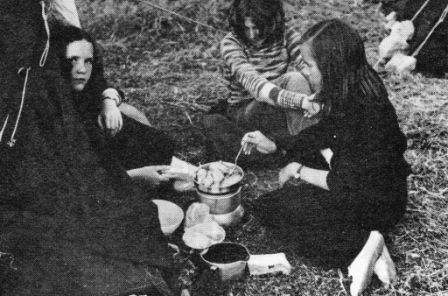
Good Morning Campers!
Julie-Marie Glennon, Erica Stapley, Deborah Brankin.
whipped and flooded the lads away from their tents, into the seclusion of the huts. Here some again spent a sleepless night for as their sleeping bags were by now thoroughly saturated, they were forced to take turns in using the only dry sleeping bag available.
It was perhaps with some relief, yet with a feeling of supreme physical fitness that the group headed for their homes next day.
The Gozo camp held at the beginning of the Easter holidays was a beautiful and rewarding contrast. The camp site was actually all grass, the weather was fine and the village of Xlendi was nearby.
Our routine was much the same as for the previous camp, except that with plenty of wood available on the hillsides, a camp fire was a nightly ritual. Lads searched the area for fuel with the diligence of a Red Indian war party, returning with not only wood but huge tree trunks. This activity was watched one night by the old Maltese goatherder who collected our scraps of food. Very concerned, the goatherder signalled to Mr. Ditcham to follow him. It was about ten minutes later that we spied a tree moving steadily along the road towards camp, and then like a conqueror, Mr. Ditcham arrived with his bounty part of a tree for our fire.
On Saturday 14th April their tasks completed, their feet blistered, and their faces tanned, the group left the island of Gozo and journeyed home.
We would like to thank those keen and interested visitors who came to both camps, and hope that on future occasions we may entice them to share with us the pleasures and adventures of camping and walking under the auspicies of the Duke of Edinburgh's Award scheme, at home and abroad.
D. DITCHAM J.I. LATTIMER
|
SAFELY HOME The wind was blowing, The snow was snowing, But on I pressed, To where light was showing.Home at last and into bed, Horse in barn, cart in shed. Curl up and go to sleep, Sleep like woods that lie so deep. KAREN FAIRMAN 1 BY
BIRTH OF A SOUL I am walking in a dark grayness, Unfeeling, Except for the realization that physical life Must go on. Physicalness A weary burden, It marks man's limitations, Restricts his freedom of the spirit, It necessitates inhibitions, Creates frustrations, embarrassments; Stifles and denies; And slowly suffocates the soul. These black thoughts push back the grayness A battle of awakening awareness As feeling grows, And the dimness recedes; Overcome by the inner rising sun . . . The mind, A soul, sees its dawn. JANETTE ROSS 5 L
DID YOU EVER SEE ? Did you ever see a butterfly? Bright-coloured, symmetrical, flittery-flight, delicate. KAREN WITHER 3 E Did you ever see a horse? Soft-eyed, ,smooth-coated, fast-moving, friendly. KAREN WITHER 3 E Did you ever see an elephant? Wrinkled-skin, floppy-eared, flat-footed. ELAINE McCARTHY 3E Did you ever see an icicle? Sharp-edged, crystal-clear, dripping-water. HAZEL ANSELL 3 E Did you ever see a tiger? Zebra-patterned, wide-eyed, hungry-looking, fast-moving. LINDA HESSELL 3 E Did you ever see a teacher? Stiff-lipped, stern-faced, sharp-eyed, hair-pulling, ear-twisting, hard-handed. JOHN CATLING THE RIVER River, river you glide along, Singing your little gurgling song. On your golden banks I see Golden pebbles just for me. River, river meander your way, Past the windmill onto the bay. River, river you glide along, Come past here and sing your song. When it rains you splatter and splash, When there's wind you strike and dash. When there is sun you hardly move, As though you're on a treasure trove. ALISON WHITE 1 AY
|
KENYA - AMO TE I remember well the garden, that haven of delight and peace: My paradise. Long stretches of flower-beds spilling profusions of Scarlet salvia and sapphire morning-glory. The puff-ball blossom of the gums splashed Between sere gold of fading mimosa; Cascades of maiden-hair veiling patches of wild orchids; Fields of pyrethrum and sky-blue flowering hatch. Small wattle bushes, ferns in a forest of camphor and podocarpus. The delight of finding drifts of hidden flowers and rainbowed butterflies. And, on the brink, a fringe of burning aloes Whose spears flamed against the flawless sky. Dusk. And the billowing tops of coffee trees beyond Like a sea of crumpled green velvet, On which to dance in moonlight, Or in misty dawn. And then the river, clear and cool, Rippling over gray boulders, and widening Here and there into still Pools. A ride in the bondu: Seeing duikers, klipspringers, crab-spiders As big as boulders, A glimpse of a ducking rock-rabbit. Heat. Climbing and sitting on the old felled camphor log, And just Watching. Watching the herds of impala Majestic horns erect Coming to drink at the waterhole, And beyond; the remote, virginal peak of Kenya: Stripped of its shroud. The wild monotonous, erring tunes of the natives And hours. The dragging days, leaden as the skies when the rains come. Kenya land of beast and cosmopolis, Of miles of scorching bush, of tropical trailing vines, Kenya, land of the free: Amo te. JANETTE ROSS 5 L |
THE SWAYING CELL
The year is 2302. Here I sit in this terrible swaying prison, swinging backwards and forwards, backwards and forwards, on and on, writing this, my diary. Let us go back to the exhibition of my time-machine. Thirty of the world's greatest scientists were present at that exhibition, but they had not come to cheer; they had come to mock and jeer. I had tried my machine twice before, but never in public. Well, something, I don't know what, must have gone wrong. There was an explosion, a large one, and it resulted in the death of twenty-seven of those scientists. As the other three scientists and I had been behind the machine, we got away with a few bruises and scars, but the others had been in front and so got the worst of it. Now the whole crowd went frantic with fear, and made a mad dash for me, kicking, throwing punches and of course it wasn't long before I was unconscious.
I woke up in a prison-cell, a dark and dingy prison-cell at that, I looked around for a bit and then went over to the door.
"Guard, guard". I shouted.
"O.K., I'm coming, I'm coming."
"Look! Why am I here and what are you going to do with me?"
"Oh, you'll find out soon enough" chuckled the guard, and started back to his office still laughing. I sank down onto the bed and tried to think. Then suddenly the previous day came back into my mind. "Oh God, what now?"
The following morning I was led outside. To my greatest amazement, in front of me was my time-machine, but it had been converted into a large glass pendulum. They forced me into the pendulum and it started to move. Every day my prison would be vacuumed and a food-package would be sent down by computer. For the first few days I was violently sick and couldn't eat at all. Scientists, photographers, school-children all came to stare at 'me. Seconds, minutes, hours, days, weeks, months, years, decades, centuries passed and I still kept on swinging and swaying in time. Nobody came to stare any more; I had not seen a human being for what must have been years. Then it came to me, I must be the last human on the Earth!
The whole human-race had been wiped out.
Still, I kept swinging and swaying,
swinging and swaying, on and on,
on and on, for ever and ever and ever and ever
ROBERT HEDGES
CAPTURE
It was early that morning when the bell of the chapel by the moat rang. The first fingers of fresh, new-born light danced and played on sleeping dogs and buzzing flies, a cold new light, crystal clear and, with it, the news that broke and snapped on our brains like an icicle.
The bell began its solemn toll, one I had never heard before. Everywhere was silent. Mothers hushed waking babies, cattle froze and the horses were like statues in the frosted fields. Even the fiery snort from their nostrils froze and hung suspended in the air. The birds, the trees, everywhere was still.
Then, in the distance, came the thud and the beat of hooves on a rough track, echoing through the tense streets. As the horse and rider drew nearer, peeping, curious eyes from behind doors, shutters and mothers' skirts could make out a herald speeding along, pounding away the earth. Dust rose like a blanket around him and his cape ruffled out behind. Head bent, and body stooped to its full length over the horse's neck, he flew past and mads me wince.
I dashed out of the door and ran behind enveloped in a choking, blinding, browny-grey mist. Others joined in and it seemed an age before we came to rest in the square by the market cross.
I sank down, my knees turned to jelly, my eyes hurt and my head swirled in a frenzy of curiosity.
Meanwhile the herald had dismounted from his sweating, puffing beast, worn to a mere ghost. He unrolled a scroll and addressed the now bustling crowd.
His words hung limp, whispering and echoing in our bewildered ears. The enemy were approaching in their numbers, coming, coming to capture the town. Faces drooped. Excitement and fear ran through the children. There was a piercing silence shattered only by a howling dog.
We turned slowly, a black shadow over us, while all the time the hand of the foe drew near.
Then there was bustle and turmoil. Gathering belongings, children, fowl and cattle, we made our way to the castle, a mass of mumbling citizens fleeing under the wing of their lord and sire, fleeing to their only hope for protection.
With a thud the heavy drawbridge was let down and we crossed over into our haven, pulling, pushing, heaving stubborn cattle in with us. Like a herd we swarmed in and the great door of our fortress closed to the outside world.
On the ramparts every man was ready, bowstring to cheek, checking the vast, green dense spreads of forests and undulating hills.
Then in the distance we could hear, our senses strained, a grinding beat. The enemy approached. Over the horizon came the lone drummer boy, black with shadow short in the midday sun. And then the rest of the army, tipping up over the brow and stretching out behind their solitary leader.
As they drew near we could see the grim, hard, set expressions on their faces with the almost jovial drummer boy treating battle as a game.
Then their commander gave the order to halt. Feet shuffled, artillery clattered. A roll on the drums commenced and produced the messenger and the York lords coming forth on two majestic, prancing horses, their bronze bits gleaming and winking.
They asked for the surrender of our Lancastrian side but we zealously replied, "Never!" They returned to their camp and then proceeded to give orders. Finally they turned to face us. Nothing stirred. And then it came, my most dreaded fear, filling others with hate. Across the empty land towards our quaking stronghold it came, booming and sickening.
"Into battle!"
With that, shouts and cries broke the sinister silence. Arrows flew and forward came the enemy pouring down and closing in.
Ladders were placed up the side of the castle. Men streamed towards the top only to find with a quiver and a shake that the ladder had been pushed back from the wall and they screamed as they fell to be left in pain or eternal silence.
Bows twanged and well marked arrows rained down on unsuspecting victims. They were going to start a siege.
It did not need a siege to have us beaten. We were few in numbers and lacked supplies.
A dull, hard crack sounded against the fortress. The battering ram had been put into use. Again and again it would pound into the portcullis. The enemy had a nutcracker. The fortress was the hard shell on which we depended. We were the fruit inside ready to be plucked and devoured.
With every ram our shell shuddered and shattered existence.
They were in, pillaging, tormenting, fighting and slaying. We surrendered, sad, unhappy, with hardness softened within us. We could not fight back. We were helpless. We had been captured.
ANNE DOWIE 3 D
A WET MALTESE DAY
I woke up and heard a steady drumming. I looked out of the window, and outside the rain was pouring down. I got up and walked over to the window and looked out to the city, where I knew the bee-like community was still humming and clicking, regardless of the weather . . . intercoms still buzzing, papers still rustling, pens still writing. Perhaps there would be the odd comment about the weather, but that would be all.
I looked down to the yard. Puddles of water lay in stagnant silence. There was what looked like a small stream flowing halfway across the yard.
I noticed a small stick in the stream and followed its path with my eyes. I followed it as it lurched, as though drunk, from side to side. Then, with one last whirl, it disappeared down the drain.
Looking up to the sky, I saw large clouds covering the sky. These clouds seemed to be claiming the sky as their own. And it did not look as though they intended to relinquish their hold in a hurry.
After I had had my breakfast, it was still raining. Behind the clouds, I could see a weak sun struggling to shine through the thick blanket of clouds.
The rest of the day passed uneventfully, and it continued raining.
In the evening, there was a thunderstorm. Every so often, the sky would be lit up briefly. Following this heavenly illumination, there would be an increasing rumble, as though a giant was vibrating a piece of sheet metal, Rolf Harris style. The rain came down in a steady stream.
That was a wet Maltese day.
CHARLES ARTHUR 1 AY
|
SATISFACTION I'm reaching out on all sides, Grabbing at the one I need most, I'm reaching out and I'm catching Everything I have sought, And I have got you now, We love each other, No more grabbing, For the better things in life. It is there in our arms to remember. PAULA SMITH L6G IN PRAISE OF THE LIVING So what are we, But growing In a universe Of ice-star glitter; and Thriving in our own warmth Under the light of moonstones, Root-seeking Down to the semi-precious bedrock For life? LINDA ROSS L 6th
|
FEAR Fear, like a mighty bird of prey, Swoops and soars with wings outstretched, Enveloping all who stumble in its path. With fiendish claws it grips the mind Which struggles to resist but fails. Fear, like a leopard, waits in silence, Searching stealthily for its prey. Then, like a sudden gust of wind, It pounces on its victim's Petrified and helpless 'body. Fear, like a poisonous writhing serpent, Coils its body round the mind, Inflicting pain and anguish, terror, frenzy, With its deadly merciless grip. Like a mighty bird or leopard, Poisonous snake with powerful grip, This creature seizes mind and body, Shakes the very soul of man, Until he learns to fight with courage This deadly creature man calls Fear. STEPHEN NESBITT 3 D
|
Well, it all started on a wet, cold and generally miserable 4th of February. Marsa Deep Water quay seemed packed full of an assortment of nationalities, all waiting for a good time. As soon as our group was assembled we proceeded to embark on to the 17,000 ton UGANDA. It all seemed so strange and we all felt rather lost, but in time we became accustomed to the various noises and continuous 'hum' from the engines.
We sailed at mid-day and were on our way to Naples for a two day stay when all the regrets of coming poured out. We hit bad weather and most people were ill and the high seas all around us seemed ominous. All thoughts of the afternoon disappeared at about 8 o'clock when a Disco' was started up. As we sailed through the Messina Straits a good time was being had by all. We went to bed with thoughts of our approaching visit to Naples.
When we woke up the next morning, all the noises of a port greeted us. In the morning we went shopping around the city and returned to the boat at about mid-day laden with souvenirs of all descriptions. In the afternoon we visited the volcanic crater at Sol-Fatara which left many vivid memories of the sulphur ruins of Pompeii where we saw many old relics of the famous eruption of Vesuvius in A.D. 79, which completely demolished Pompeii and two other cities in the area.
We returned to the boat looking forward to a three day sail to the myth-shrouded Greek island of Rhodes. The weather during these three days was fantastic and we spent most of our time in between lessons just lazing around on the top deck. We also went swimming in the pool on board.
We arrived in Rhodes at 7.00 a.m. on February 9th. By 8.30 we were on a coach heading for a town called Lindos on the south-east coast of the island. We arrived there about 11.00 a.m. and spent the rest of the morning looking around the hilltop fortress dedicated to the Goddess Athena. From there we obtained some breath-taking views of the surrounding area. The afternoon was spent browsing around the old Turkish quarter of Rhodes town and by 8.00 p.m. we were on our way to the city of Istanbul.
We had one day at sea. sailing through the Dardanelles, and then passed into the Black Sea which houses the port of Istanbul. When we were walking around the city, vivid memories of the beauty of Rhodes, lingered in our minds. Istanbul is not what every one thinks at all. The streets are mud-coated and the general appearance isn't too impressive. In the afternoon we went sightseeing to the Blue Mosque, the Kopkapi Palace Museum and also the famous Santa Sophia Mosque with the seven minarets. On the returning bus journey we passed over the famous Garata Bridge and from there had two super views of the UGANDA.
At 8.00 p.m. we left for Piraeus, the famous port of Athens. A days sailing brought us there. As we docked the first rainy day of our cruise greeted us. In the morning we went on a guided tour to the ancient Acropolis and Parthenon. It was freezing cold but this did not stop us from enjoying ourselves. The historical facts and figures were rather boring but generally we found much to interest us. In the afternoon we went independently sightseeing, when we took a train from Pireaus to Athens city and also five members of our party got lost but returned to he ship on their own. This caused anxiety and a few bad tempers but all was back to normal by the time we were on our way to Corfu at 9.00 p.m. that evening.
We anchored just off Corfu at 8.00 a.m. the next morning and were taken ashore in the lifeboats, since the UGANDA was too big to dock in the harbour. The rain dampened our spirits a little as we all got soaked. When in Corfu we found a restaurant, 'Dirty Dick's', in which we spent the morning drying off, although a few of us wandered around buying souvenirs. In the afternoon we took a bus to a monastry (on the south side of the island) which was very intriguing. The lifeboats took us back on board and we left on our last lap to the 'sinking city' of Venice.
A day's sailing up the Adriatic with some beautiful views of Yugoslavia brought us to a rather cold but sunny Venice. This was the 16th of February, a Friday, and we were not looking forward to the Sunday, as we were to be going back to Malta. Venice was really fascinating with its St. Mark's Square, bridges, canals and gondolas. We spent all day in Venice just browsing around.
On the Saturday most of our cruise departed for Malta. Tal-Handaq and about three other schools were having an extra day which was spent freely. On the Saturday a massive 'fare-well' disco was held although students for the new cruise were already on board. We left the UGANDA at 6.00 a.m. on February 18th, to arrive at Venice airport at 9.00 a.m. We flew from Venice landing in Malta at approximately 11.00 a.m. We all enjoyed the cruise tremendously as we had visited many places and met many people. All of us were sad in a way to be back from the UGANDA, but vivid memories still remain, I think, with us all.
SARAH MANNINGS 3 E
OUR CRUISE
We boarded the ship Uganda
On a rainy day
The sea looked very black and rough
What would come our way?
Once we were out of the harbour
People began to look green
People rocked from side to side
What a gloomy scene!
Next day the sea calmed down
Our stomachs went to rest
Then we trooped into Naples
Our cruise was at its best
Down to where the ruins are old
Where the lava is black.
Where the walls are green with mould
Down a dusty track.
Rhodes, Athens, Turkey whizzed by;
Next, to Malta we did fly
After Uganda we'd said goodbye
It is now all written down,
What I have to say,
All that I have been through
Since that rainy day.
ANGELA MARSH 3 D
THE SCHOOL CRUISE
Thirty-one pupils of the third year from this school recently went on a cruise aboard S.S. Uganda. I was one of those thirty-one. We left Malta on the 4th February full of energy and bounce. We arrived back in Malta on the 18th February drained of all our energy and bounce but full of happiness and a greater understanding of what's going on around us.
Our first port of call was Naples, a sunny and bright city full of life, the people happy and smiling but often sad as there is great poverty in Naples. Then a long jump to the sunny island of Rhodes. Inhabited by Greeks, this island was to me one of the best places on the cruise. The sleepy neat little village of Lindos plus the beauty of the countryside will always stay in my memory. Then to Istanbul. A city of 1.7 million people, poverty, mosques and minarets. It is the bridge between the East and the West. Now although the city is very dirty it is still evident that the Turks were once a mighty people. Next on our itinerary was Piraeus and Athens, two clean modern cities. We saw the world-famous Parthenon and the Acropolis. Maybe it is the cleanliness that leaves an impression on the mind. The next stop was Corfu, a little brown island. It is also a beautiful island with wonderful panoramic views. It is also a Greek island. Then the last port of call was Venice, City of canals and waterways and gondolas. It is a charming city and I will always remember it. And then, sadly, we returned to Malta after a very enjoyable cruise which was more than just a holiday.
GERARD McGRATH 3 D
THE FASHION SHOW
A fashion display was held in early March this year, by the Home Economics Department. The whole venture was a great success owing to the hard work of the pupils who made and modelled all garments under the excellent supervision of Miss Turner, head of the Needlework Department.
Over ninety different garments were displayed, varying from beach-wear for a long hot Summer's day, to evening gowns for cool Winter nights. The wedding attires of the former Miss Wood and Miss Fletcher, made in the school, were shown to an appreciative audience. The whole show was compered by Philippa Reiss and Jill Pelan, and over 300 guests attended. Afterwards Miss Hill and her willing helpers provided some welcome refreshments
Many thanks should be extended to pupils, staff and audience for making the occasion such a successful and enjoyable one.
JILL PELAN LYNNE MITCHELL
SCHOOL GUESTS
This year a constant flurry of activity has taken place in the domestic science room. This was heightened to fever pitch on three important occasions. To the sound of saucepans and the clash of cutlery, preparations were made while the whole school hung round the cookery room (forbidden precincts), tantalized by the intriguing smells that emanated from it. The glazed eyes of the cooks betrayed how hard they had worked but, well versed in the Official Secrets' Act, they didn't divulge even the most insignificant item on the menu. Those who enjoyed these delights claimed that they 'on honey-dew had fed and supped the food of Paradise'.
The guests we entertained, Captain and Mrs. R.E. Wilson, Rear -
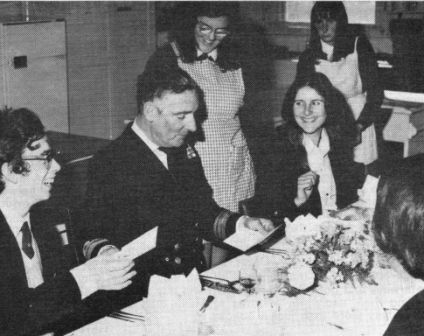
Decisions and decisions! Savarin a la Pompadour or Milanese Souffle" Lorraine Woodfin and Karen Beer are on hand to take the order.
- Admiral Templeton-Cotill and his Aide-de-Camp Lt. Simon Bailey, and Captain and Mrs. Brierley, rapturously voiced their approval of these delicacies. Further more, the menu, which had been specially prepared in close collaboration with the French department for the Admiral's visit, was enthusiastically signed by everybody there.
Needless to say those sixth formers who were present are petitioning for many more such lunches and the rest, their mouths watering, are competing for invitations.
This burst of activity was not confined to the Domestic Science room; girls throughout the school slaved away in a hectic rush to finish their soft toys for the competition which Mrs. Wilson came to judge. Alanbrooke won the competition, Tedder coming a close second. It was apparently very difficult to select the winner since the entries were so very good.
The sixth form were shown a fascinating film by the Admiral, made when he was Captain of Bulwark. It was a revelation to learn how versatile a Captain in the Navy had to be. An example of this was when the Admiral, who had had to assume Command in a hair-raising episode when the local navigators at Toulon had nearly caused Bulwark to collide with the quay, had to go directly to an official dinner with local authorities. The sixth form thoroughly enjoyed the film and the discussion afterwards and look forward to similar occasions as do the cooks despite their exhaustion after such intricate and lengthy preparation.
DEBORAH HILLYARD U 6th
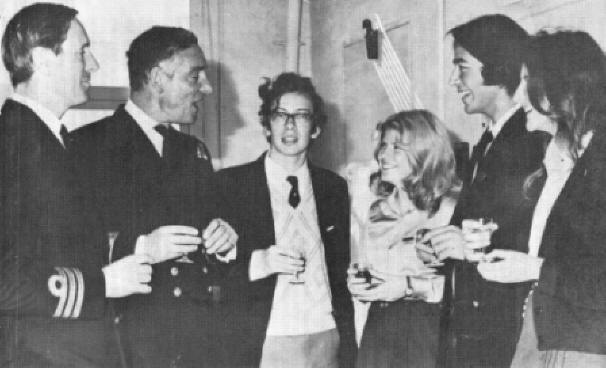
Rear Admiral J. Templeton-Cotill enjoying a pre-lunch sherry with the Headmaster and members of the sixth-form, Michael Lees (Deputy Head Boy), Linda Stapley (Deputy Head Girl), Timothy Agius-Ferrante (Head Boy) and Deborah Hillyard (Head Girl).
I was delighted when Commander M, Law, the present Headmaster, asked me if I would co-ordinate the news of old Tal-Handaquians and staff. As you know a lot of the records were lost or mislaid in the withdrawal of Jan/Feb1972 so I find it is almost impossible to classify people by their year groups on entering or leaving Tal-Handaq.
I have therefore decided to deal with most people in alphabetical order but in my final paragraph I have included news of former pupils which has not been directly authenticated: I hope if they see this, they will write in and either confirm or correct what has been said of them. We have naturally kept to the more recent leavers, but I hope that if this magazine should fall into the hands of any ex-staff or former pupils that they will write in, so that their news may be included in the next copy of the magazine.
Armstrong Sean, Mark and Patrick (the triplets). Sean and Mark are now about to take A levels and hope to obtain University places next September. Patrick has left school. I gather he intends to take up Forestry.
Bryant Roseann and Billy. Roseann writes that she started work in the National Savings Bank in Glasgow but has now transferred to the Home Office in Corby, Northants. Billy is working as a metallurgist and has boug'ht a car. Roseann gives news of Elizabeth Gibson who is now at a Drama College, also that Pauline Macdonald is now working in Switzerland, and that Gail Miles was married.
Barraclough -- Claire and Nicola. Mr. Singleton recently heard from their parents who told him that Claire had been accepted as a student by the Royal Academy of Music and that Nicola was studying Hotel Catering.
Bradley - - Debbie and Robert. Debbie is now married and is living in Texas (Mrs. Hill) her brother Robert hopes to go to a University in September and is now working.
Bull Helen, Richard and Jeremy: The Bull family were posted to Cyprus at the time of the withdrawal of the forces from Malta: all three attended St. John's, Episeopi where Helen took more O Levels: she is now hoping to be accepted for a commission in the W.R.A.F. Richard and Jeremy are now at school in Cornwall.
Burrell Hilary Burrell spent a year at Fishponds College of Education Bristol, but decided that teaching was not ''her cup of tea' she is now working at a hotel in Dorset where she is enjoying life to the full.
Coupe Wendy and Christine. Wendy completed the teacher's training course at Homerton College Cambridge, she then decided to join the W.R.A.C. She is now attached to the R.A.E.C. Her first posting was at Aldershot but is now working as second in command at the closed circuit television wing at Beaconsfield. She hopes to be promoted Captain in June.
Culter Patricia and Georgina, Patricia is a final year student at Trent Park College of Education. Georgie is at Camberwell College of Arts and Crafts.
Duncan William, is now music master at Saltus Grammar School, Pembroke, Bermuda: he is also organist and choir master at the Pembroke parish church. He has also bought a house in Scarborough where his parents now live.
Dunning Belinda, is now in her last term at The Royal Naval School for Girls at Haslemere. She hopes to go on to one of the universities next October. As her parents live in Malta I hope she will let us know her A Level results and future plans.
Fox Caroline likewise keeps in touch as her parents have a flat in Ta' Xbiex. After a secretarial course, Caroline has been doing Social Work with the Borough of Lambeth as an assistant house-mother in one of their children's homes. She has decided to try work in a travel agency before committing herself to a career in Social Work.
Green -- Susan was in the fourth year here at the time of the withdrawal, she then spent two terms at Burford School but has now transferred to Stowmarket School.
Hamblin Frances and Timothy. Frances was in her final A Level year at the time of the withdrawal and eventually found a convent school at Slough which could offer her syllabus: she gained three A levels and then spent a term at a teacher training college but withdrew in order to gain better A Levels and qualify for a place at Warwick University. As her parents are now in Cyprus, she is now in the upper sixth at St. John's Episcopi. Timothy is now a boarder at King Alfred's School, Wantage.
Hann Julie is enjoying her course at Rolle College of Education.
Hoctor - - Richard and Elaine. Richard is now teaching Maths and P.E. at a school in Birmingham. Elaine is in her first year at Leicester University. She visited the school at Christmas.
Powell Martin is in his final year of a course of Business Studies at Leeds Polytechnic. An account of his visit to Buckingham Palace and Arundel Castle in connection with the Duke of Edinburgh's Gold Award appear elsewhere in this magazine. Martin has offered to organise/coordinate a meeting in London of old Tal Handaqaians; possibly at next year's Boat Show; he would like any who are interested to send him a stamped, addressed envelope. He will then contact them with suggestions regarding the time and place of the meeting. (Perhaps this could be organised in other centres).
Potts Evan is in his last year at Manchester University. He hopes on graduating to work in London. He is now married.
Perry Linda visited Malta last autumn. She works for the Southern Region Gas Board and is anxious for news.
Marsh Colin left Malta at the time of the withdrawal to attend an "0 Level retrieval course" at a technical college in Salisbury (he passed in all subjects). He applied for a cadetship with the Bibby Steamship Line, and was accepted and after an induction course at Fleetwood Nautical College he joined the M.V. Warwickshire as a navigating officer cadet. His 1st voyage included New York and a round trip to the Far East. He is now waiting to join the M.V. Herefordshire, another ship of the Bibby Line.
Metcalfe Ian and David, Ian is now at Chippenham School. He has seven O Levels and is now working for A Level in Chemistry, Physics and Maths. David gained very good A Levels in the summer of 1972 and is now at Aberystwyth University, reading History with Philosophy and Classical studies.
Millard Colin is a Lieutenant in the Navy and is in his final year at the Royal Naval Engineering College, Manadon. He is married, with a small daughter.
Morris David is studying Dentistry at Leeds University Dental School.
Stevenson Jane and Julie. Jane is reading Single Honours Botany at Exeter University. She is aiming at a 'First' and then 'hopes to take up research. This summer, she hopes to spend her vacation helping at a holiday home for foreign children in a 13th century farm on Dartmoor. Julie is at school in Edinburgh and takes O Levels this summer.
Tatton - - Penelope had to abandon her nursing training half way through the course on account of a back injury. She applied to Southampton University and is now reading History; she is engaged to a second year zoology student.
Vickery -- Nigel joined the army and wss stationed in Germany -in his most recent letter he was back in England recovering from a cerebral tumour operation and I hope he has by now completely recovered. He is engaged to Margaret Logan, a former Tal Handaq pupil.
Vingoe -- Michael gained a B.Sc. at Liverpool University and is now teaching General Science at Haling Manor High School, Croydon. He was in Malta for a holiday last summer. He gave news of the Ross brothers. Peter is doing research at Imperial College, London and Robert is at the University of East Anglia.
Wilkinson -- Christine is in her second year at Balls Park College of Education Hertford; she is enjoying life now that she does not have to live in Hall. She would like to get in touch with some of her old friends again.
Wujastyk Dominic is working hard at Imperial College London where he is in the second year Physics course.
Vincent! -- Joseph is now a Malta business man, trading, I believe, with the firms operating in the Libyan desert. He is as cheerful as ever.
News has been indirectly received of the following: I hope they will see this magazine and write in to confirm or deny what has been printed here:
Arden -- Rosemary in her final year at the Froebel College.
Carter - - John is doing Chemistry at the London Polytechnic and hopes to join the R.A.F.
Carey Brian doing research at Sheffield University.
Gray Susan is shortly to be married and will be returning to Malta.
Gale - - Robert has joined the B.B.C. as a cartoonist and his work has appeared on T.V.
Hall - - Wendy has joined the W.R.A.C.; she has obtained a commission and is now adjutant of the White Helmets Motor Cycle team (this sounds very thrilling).
McReady Christopher and his wife (Felicity Burge) are both working in London. Felicity is I think with the B.B.C.
Turley -- Ronald is now an officer in the R.A.F. while Carol is in her second year at Bangor University.
Mazure Monica was here for a holiday last summer and I believe won a scholarship to do research in photography, she has had some of her cartoons shown on B.B.C./T.V. Her sister Marjeka is spending a third year at school as her A Levels were not good enough for a University place. I hope she has now 'been accepted. Mark is already at one of the colleges of London University.
Willey Susan is in her last year at Rolle College of Education. Her brother Nicholas is due to take A Levels next year but may have to change schools as his father has been posted to Naples.
Several old pupils have asked for news of Ann Bacchus but no one had any details of what she was doing; similarly people have asked for news O'f Susan Dodson and Penny Goodfellow.
In conclusion I hope those whom I have left out will forgive me and that I shall also be forgiven for any inaccuracies. The Headmaster has asked me to write a history of Tal-Handaq for next year's copy of the
magazine and I shall be very grateful for any assistance in the way of material from ex members of the staff and pupils.
Finally may this short article help to reunite all those who have happy memories of their days at Tal-Handaq.
Jacqueline Yule.
DUKE OF EDINBURGH'S AWARD.
Martin Powell especially wanted Mr. Tomlinson, who had been in charge of the Duke of Edinburgh's Scheme at Tal Handaq, to be one of the two guests he was allowed at the Presentation of Awards at Buckingham Palace. Martin sent in Mr. Tomlinson's name but heard nothing further so was delighted when, on arrival at the Palace, he met him. Here is Martin's account of his visit to the Palace and on a later occasion to Arundel Castle.
"You asked for an account of my visit to the Palace with Roy Tomlinson. Well, I don't know if it would really make very interesting reading. There were 800 award-winners there, with 2 guests per winner, so it was a real mass-production affair. Groups were assembled throughout the palace, 20 or 30 to a group, by districts. The Duke merely whisked through, spending a couple of seconds with each group, with a couple of words for those at the front. The certificates were presented afterwards by the local 'delegate'.
Far more personal was the reception I went to at Arundel Castle, given by the Duchess of Norfolk for all Sussex winners. The Duchess laid on tea and so forth for all, parents and officials as well as award-winners, and there was about an hour of chatting with each other, before the Duchess presented the badges and spoke to each winner in turn. That in all lasted for a good two hours, the palace affair, effectively two minutes! All in all I was very pleased to go to the palace though; many don't; plus the fact, of course, I saw Mr. Tomlinson".
NEWS FROM PRINCE RUPERT SCHOOL.
I was fortunate enough to be offered a position as Head of Geography at Prince Rupert School, Wilhelmshaven. For those of you who don't know where this is, it is on the north coast of Germany, between Denmark and the Netherlands. Absolutely flat, with Wilhemshaven rather like a German Skegnsss. It was a boarding school, which was an interesting experience for me, who had never been in one before. I was made Housemaster of the first year girls' house, a bit of a come-down for one who had led St. Vincent, the premier house of Tal Handaq.
We were in Wilhelmshaven for one term, a very busy one, as the whole school was moving south to Rinteln, a very pleasant little town in the Weser valley, not very far from Hameln, of Pied Piper fame. We moved at the end of the summer term and it was in the British Medical Hospital, Rinteln, that our baby daughter, Dawn Louise, was born; the first Prince Rupert School Rinteln baby.
Our first term in a brand new school was just as busy. The school is situated on a hillside, overlooking the Weser valley, with forests clothing an 800' ridge behind us. We have our difficulties, as the great majority of our pupils have to travel by bus to the school, sometimes for over an hour, just as they have to do in Malta. It is not easy to organise out of school activities owing to transport problems, so many of our sporting fixtures have to be arranged within school time.
We are trying to compensate for after school activities by organising as many courses and trips as we can with help from the Youth Services
Officer. So far we have had three very successful skiing courses, one in Austria and the other two in the Harz mountains which are divided into two parts by the East/West German frontier. I accompanied the pupils going on the first Harz skiing trip, and found it very interesting. I have never been skiing before, but I am sure I will enjoy it once I have discovered how to stop. I am reliably informed that at the end of one ski-run, I bounced at least a yard into the air after landing on my back. I cannot vouch for it myself, as I was too busy screaming in agony.
More courses are being organised, including a canoeing trip along the Weser, and a journey to Switzerland, to explore the foot-hills of the Matterhorn, and I think we shall build up a very successful series of out of school activities on these lines.
To conclude, I wish Tal Handaq continuing success. We enjoyed our stay in Malta immensely and Martin (whom some of you may remember as the small boy running up and down the touchline at Corradino and at intervals making off with the match ball), my wife and myself would like to think that pupils and staff are enjoying it as -much as we did.
Frank Smith.
NEWS OF FORMER STAFF
Many former members of the staff have transferred from Tal Handaq to other Service schools under S.C.E.A. and it is they who have sent the bulk of news for this article.
Mr. Brian Jackson is now Head of the History Department of the Gloucester School, Hohne Germany, (B.F.P.O. 30). He enjoys the work but both he and Mrs. Jackson wish they were still in Malta. Mr. Finbarr Houston is Head of French at Queens School, Rhein Dahlen Mr. Howard Griffiths is there, also Mr. Dan Davies who is Head of Biology and Mr. Heath, so there is a Tal Handaq quartet who must often recall their time here. Mr. David Hudson is Head of Chemistry of Edinburgh School, Munster where Mrs. Julia ,Swan teaches D.S. Mr. Frank Smith is Head of Geography at Prince Rupert School, Rinteln. Miss Maureen Williams teaches music at Cornwall School, Dortmund; her contract will be up this year. In Hong Kong Mr. Harold Harris is Deputy Headmaster at St. George's School. Mr.lan Campbell is Head of Music at St. John's School, Episkopi, Cyprus. Other ex-members of the staff have settled once more in the United Kingdom; among them are Mr. and Mrs. Gerrard who both teach in a girls' Public boarding school at York. Mr. Gerrard is especially proud of his choir.
Mr. Alan Jones is now teaching in a primary school at Milford Haven where there are quite a few American children whose fathers work in the local oil companies. Mr. David Getter is Head of Classics at Dunstable Grammar School.
Miss Gwyneth Reed, who was in charge of needlework here for six years, after a spell of teaching at March in Cambridgeshire has now been appointed Head of Needlework at a school at Littlehampton (she does not give its name) where there are 2,000 pupils and 100 staff it is a mixed school and the boys like needlework! And do very well too. Mrs. Gillivray, who with Mr. Gillivray had just returned from teaching in the Gilbert and Ellis Islands, has been "on supply" at this school.
Mr. and Mrs. Hitchcott are living in Somerset Mr. Hitchcott has not been well for some time Mrs. Hitchcott is teaching Geography at Milfield School.
Mr. and Mrs. Barraclough are living in Farnham, Surrey and have both got teaching posts.
Mr. Gallagher is now working as an advisor on teacher training in Teheran this involves a certain amount of travelling over Persia. He is much happier than when he was on the Ivory Coast where the cost of living was prohibitive.
Recently we had a visit from Mr. Roy Tatton who came to Malta on a Naval course for R.N.V.R. officers he visited Tal Handaq and met many friends. He is teaching at Cheshunt but, as he has bought a house in Kent, hopes to get a post nearer home.
Mr. Garvey is teaching Physics at a girls' private school at Bruton, Somerset.
Two ex-headmasters are still teaching Captain Mannering at Cheltenham Ladies College and Captain Broad at Millfield School.
Mr. Battye and myself, have remained in Malta and I am sure that there are many former members of the staff who, should this magazine fall into their hands, will come forward with news for, from my experience, very few regret their time in Malta.
JACQUELINE YULE.
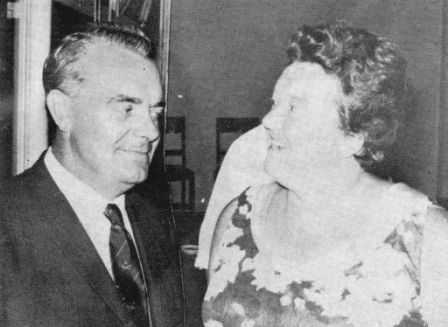 INSTRUCTOR CAPTAIN AND MRS H. BRIERLEY
INSTRUCTOR CAPTAIN AND MRS H. BRIERLEY
Captain and Mrs. Brierley left Malta on 22 May 1973 on completion of Captain Brierley's two years as Officer in Charge Service Children's Schools Malta and Naples (and initially Tripoli as well). The school owes a great deal to them and this magazine would not be complete without a short tribute.
Captain Brierley was the first person to come to Malta as Officer in Charge Schools, his predecessor having first been Headmaster of Tal Handaq and then Headmaster/Officer in Charge Schools (combined), before the jobs were split in January 1970. The Brierleys were thus responsible for setting the pattern for the job in its new form and, not having the initial advantage of close contact with one particular school, they could easily have settled into a pattern of remote detachment from all of them. To their credit and our advantage, this did not happen.
Captain Brierley has been both personally involved in and concerned for everything that has happened in the schools, particularly during the withdrawal and return, one of the few advantages of which was that it brought the Head Teachers and the Officer in Charge Schools into even closer contact than before. During this time we have seen him doing everything in his power to improve the lot of both the pupils and the staffs of the schools and much has been achieved as a result of his efforts.
Both Captain and Mrs. Brierley have also always shown a keen interest in all that has gone on in the schools and it seemed that no invitation was ever turned down. Certainly every public occasion at Tal Handaq has been graced by their presence and we have been fortunate enough to see Captain Brierley on a good number of private occasions as well.
Finally, this tribute would not be complete without a reference to Captain and Mrs. Brierley's work on the social and welfare sides for the teachers and their families. Their hospitality has gone far beyond the demands of duty and Mrs. Brierley has achieved a major personal triumph in setting up the SCEA Wives Club, an organisation which has so successfully brought together a large number of teachers' wives and provided them with numerous interests and activities, the need for which has been felt all the more since circumstances have prevented them from taking teaching or other jobs.
Captain and Mrs. Brierley have earned the affection, admiration and gratitude of us all and they take with them our very best wishes for the future.
The school takes this opportunity of welcoming Instructor Captain P.O. Stanley B.Sc. Royal Navy as Officer in Charge Schools and we are looking forward to seeing his wife who expects to join him in August.
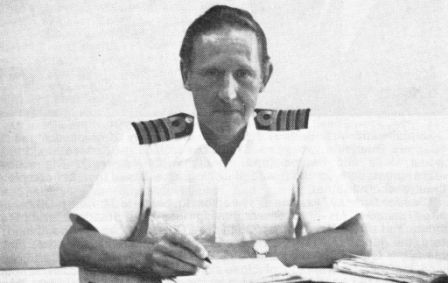
FROM THE EDITORS
The Editors would like to thank formally, but no less sincerely, all those who have assisted in the production of the magazine.
These are pupils and staff who have contributed the copy; there are those who have advertised, thus providing vital financial support.
Miss J. Yule kindly compiled news of ex-pupils and staff.
We thank Mr. D. Ditcham and Mr. J. Naylor for the many photographs, and Miss R. Leighton for organising the line-drawing.
Finally we are deeply indebted to Sandra McCallum and Ann Ryan (supervised by Miss MacKay) for a mountain of efficient typing.
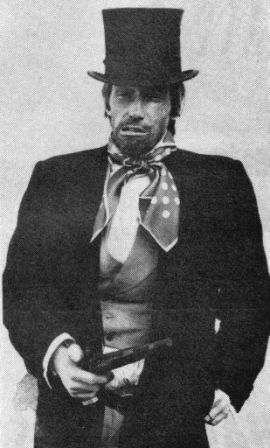
"It's a dark night
but it's light
enough for what
I've got to do
.... Write an article for the
next School Magazine of course!!
If at school
poems, essays, articles, news of clubs or
societies to which
you belong.
Leaving school this year
Whether pupils or staff, send us news of your movements and achievements during this year, for the ex-pupils section.
Already left
We shall still be glad to hear from you. Don't wait to be asked, get your news to us before Easter, and contribute to next year's magazine. REMEMBER the quality of the magazine depends entirely on you !!!
